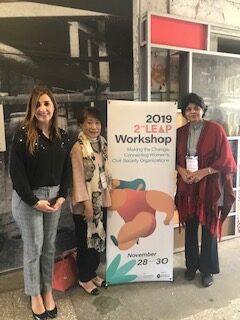
The organisers:
Foundation for Women’s Rights Promotion and Development serves as an information exchange platform for promoting women’s rights and gender equality in Taiwan. One of their vision is to help women’s groups engage in international exchange and participation and showcase their achievements on gender equality activities to the world. Therefore, the LEAP Workshop is held for connecting international organizations, continually servicing as a platform for local organizations to join global networks where they may discuss important topics and exchange experiences.
1. Purpose
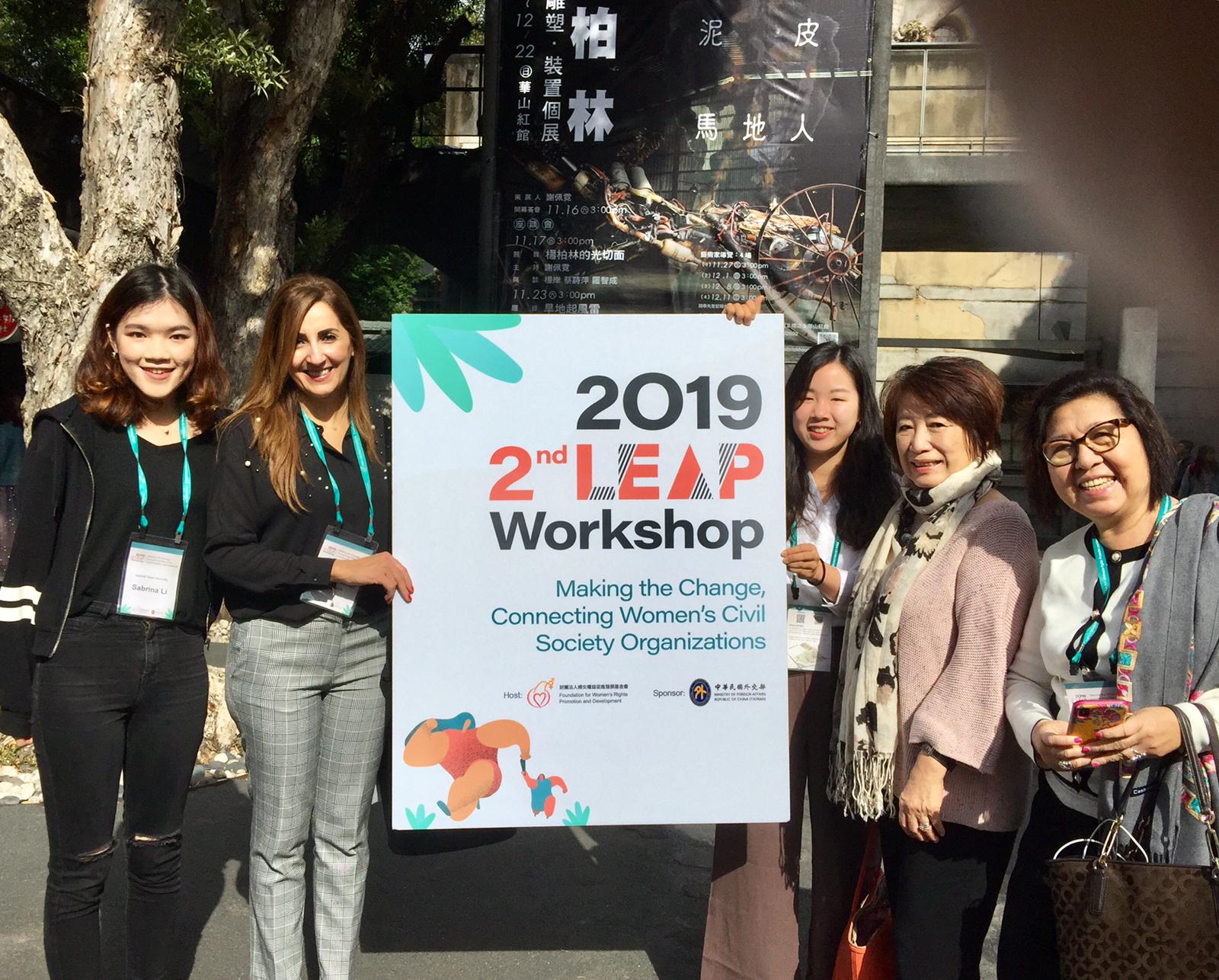
The year 2020 marks the 5th anniversary for the UN’s Sustainable Development Goals (SDGs), as well as the 25th anniversary of the Beijing Platform for Action. As a result, 2020 is an optimal time to review the development and challenges of gender equality. Echoing SDGs and Beijing+25, LEAP Workshop provides an excellent opportunity and venue for women’s organizations interested in discussing the processes and lessons of SDGs and Gender Equality related development.
Therefore, the foundation has invited about forty representatives from over twenty NGOs to gather with the goal of discovering new methods for transnational and transregional alignments under the SDG and gender framework. To be able to bring gender equality and sustainable impact from a local to global scale and create a more diverse and inclusive future through collaborative initiatives and actions.
2. INLW Participation
Ms Maysing Yang has played a tremendous role in connecting INLW board members with various civil society organisations in Taiwan and highly distinguished guests. We would like to thank her on behalf of the INLW board for her invaluable efforts and positive energy to promote INLW

Panel I: B+25:Participation, Accountability and Gender-Responsive Institution
In this session, I explored Morocco’s process and expression of women in public and political decision-making, and the actions INLW Morocco Chapter and the other civil society organizations has taken to promote women’s participation in public life and decision-making.
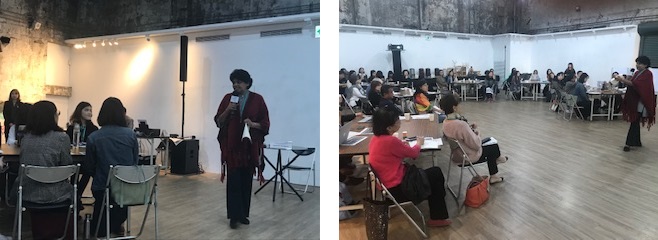
Female Role Models are Crucial for Achieving Gender Equality
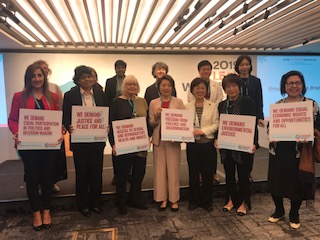
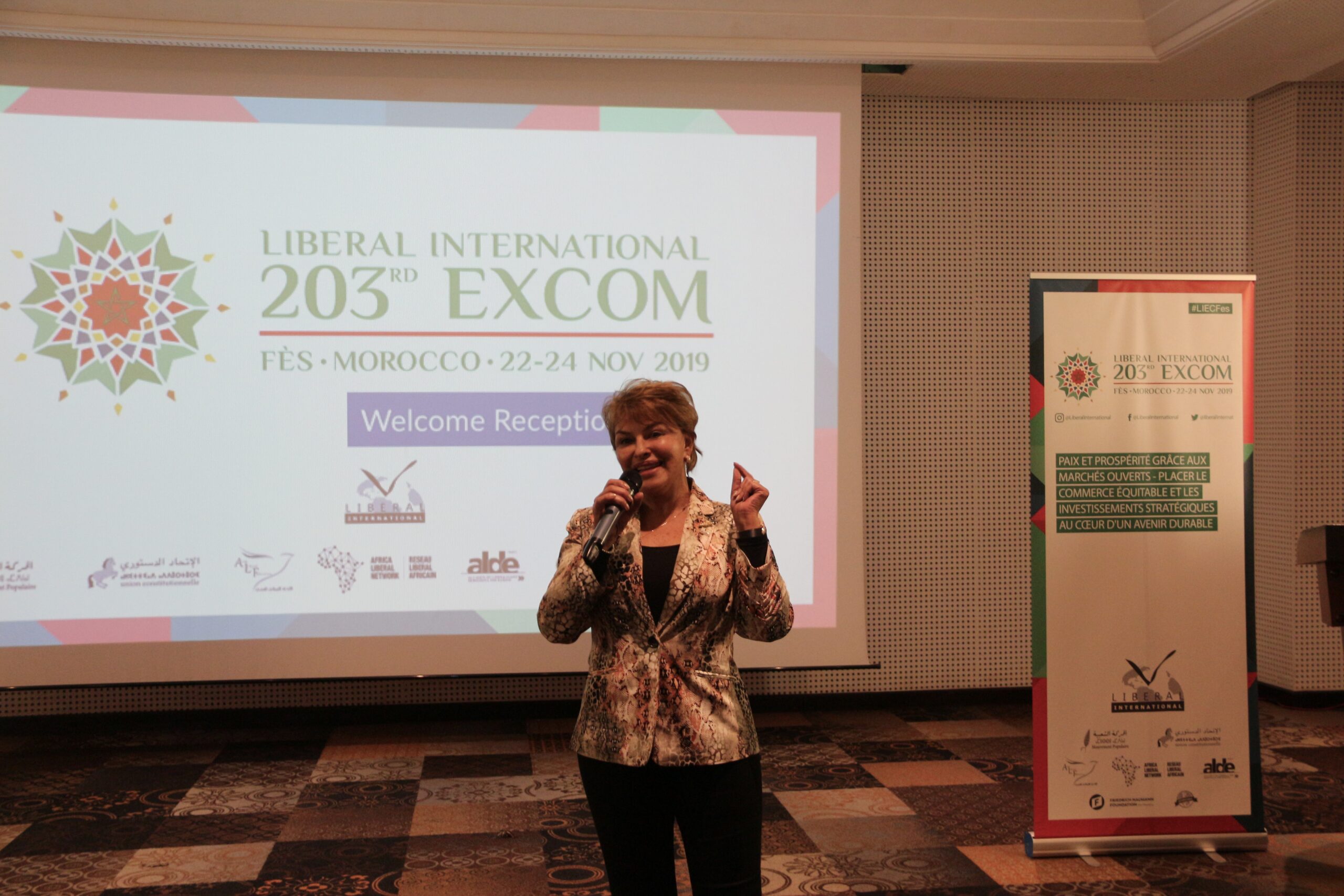
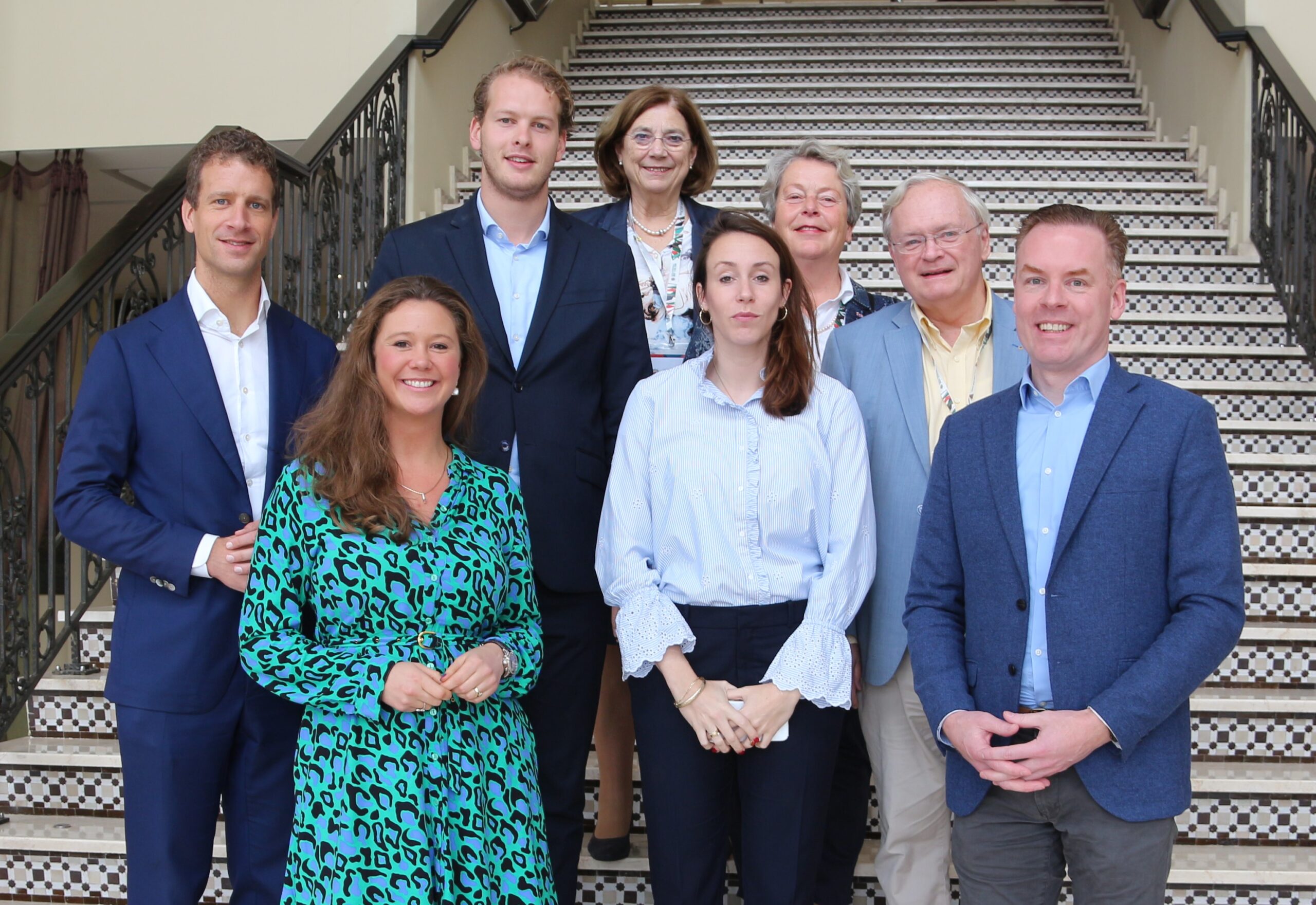
This year Liberal International met for the Executive committee in Fès. The Liberal family was present with over 80-members from 27 countries and 32 parties from all over the world. At the welcome reception, Hakima el Haité president of LI, was very happy to see so many friends in Fès, her place of birth. The main theme of this meeting was “Peace and Prosperity through open markets”, also we met to finalize the renewal of the organization by finalizing the discussion on LI’s constitutional amendments. by The WIPP (women in political parties) inclusivity handbook was presented. The aim of the WIPP Inclusivity handbook is to strengthen the political participation of women. All LI member parties will receive a copy during 2020 and will be asked to complete the WIPP inclusivity Index for their party and send it back to LI headquarters for further analysis.
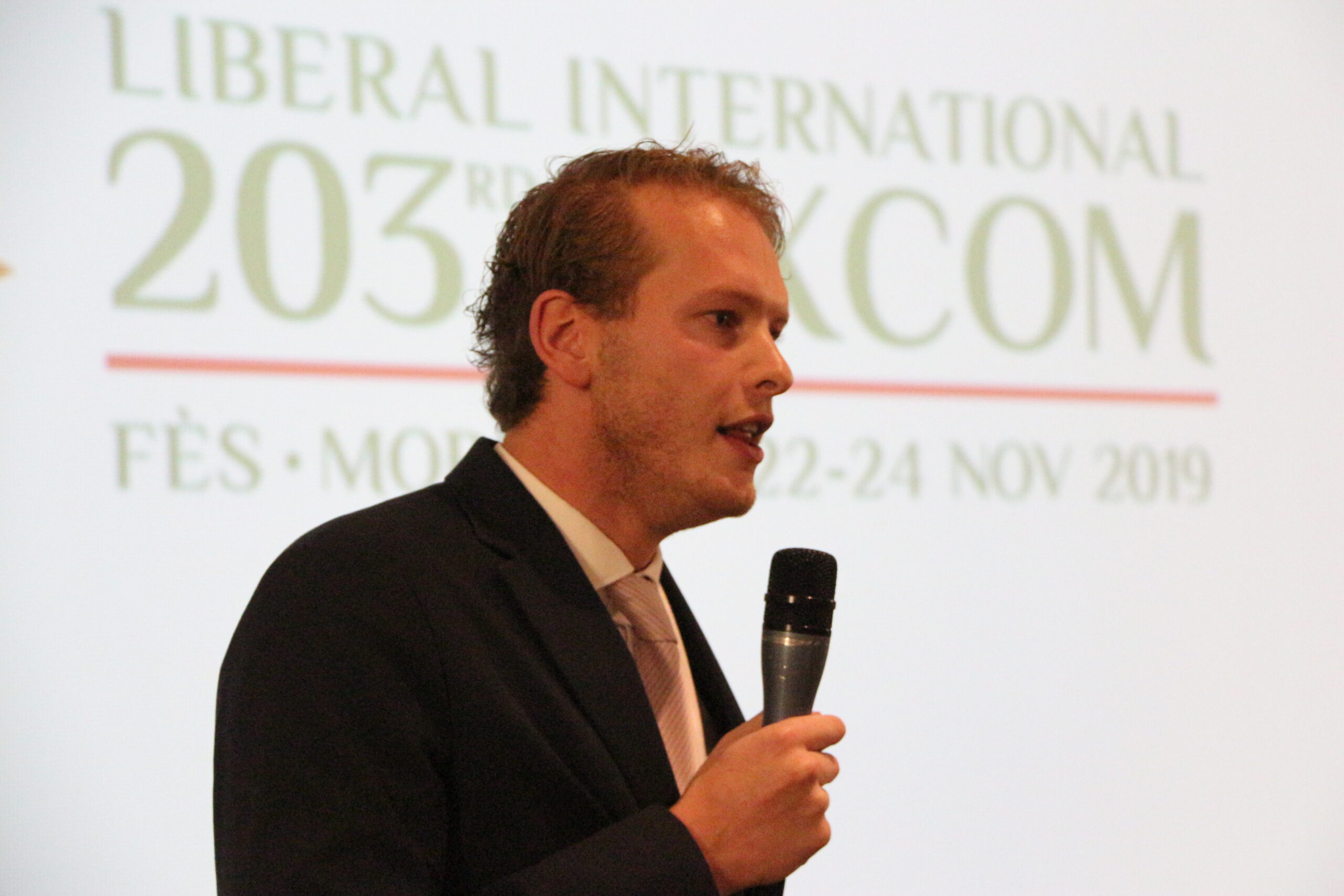
During the opening reception there was also the introduction of the Liberal Democratic Training Academy, a partnership between LI and VVD. Gijs Houben, member of the VVD, gave us some insight in the setup of the academy. It is for training politically oriented, high potential and talented youth. One of the young talents told us in her speech how she now had seen that your choice is more important than abilities, advocating for youth and defending liberalism and through her training she became really interested in politics and wants to use her new knowledge for the liberal party.
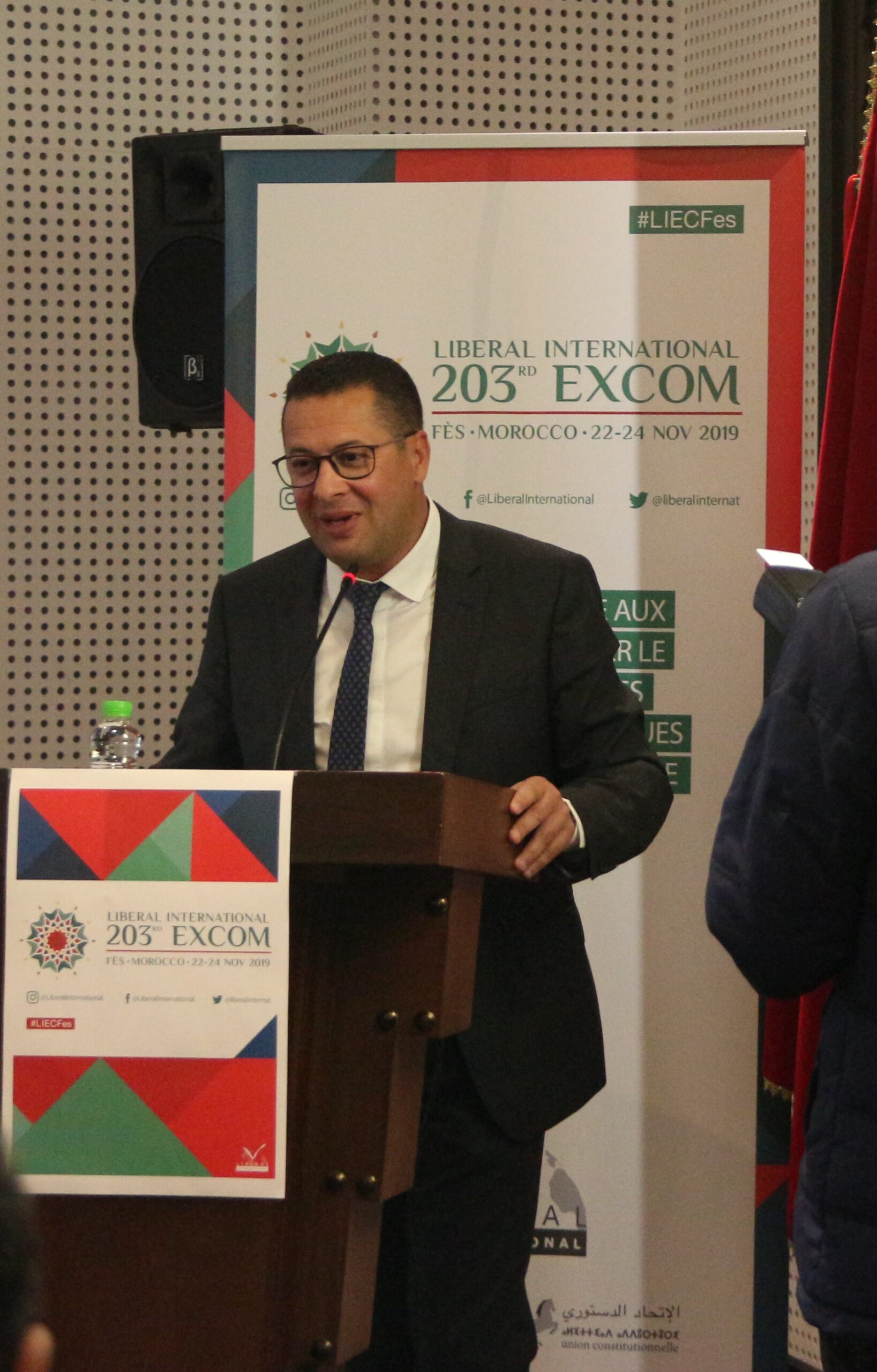
The opening gave us Mr. Mohammed Rherras, director of Human Resources, Ministry of Culture, as master of Ceremonies. He introduced himself by giving some information about Fès. We find the oldest university of the world in Fès, and this was started by a woman.
Hakima el Haité told us about the beautiful architecture of Fès with the Medina with its 5 gates and over 1000 streets. The Medina is certainly worth a visit. She continued with: “For the future the infrastructure of water will be one of the most important issues in the climate discussion. Basic needs are freedom and human rights in a changing world of economic, political and multilateralist differences between countries. We must work for peace and democracy, it is good to wish to make money, but work must be re-invented. Realism is necessary in human rights, climate change, poverty and inequality while respecting partnerships that promote democracy and stability. We must not be blind that by just making money you can also create poverty. Space for fair trade and responsible partners with support of all political parties”. Hakima el Haité gave us food for thought at this opening of our 203rd ExCom and she thanked her liberal Moroccan party, le Mouvement Populaire, for all the support she has had in the past and still gets now.
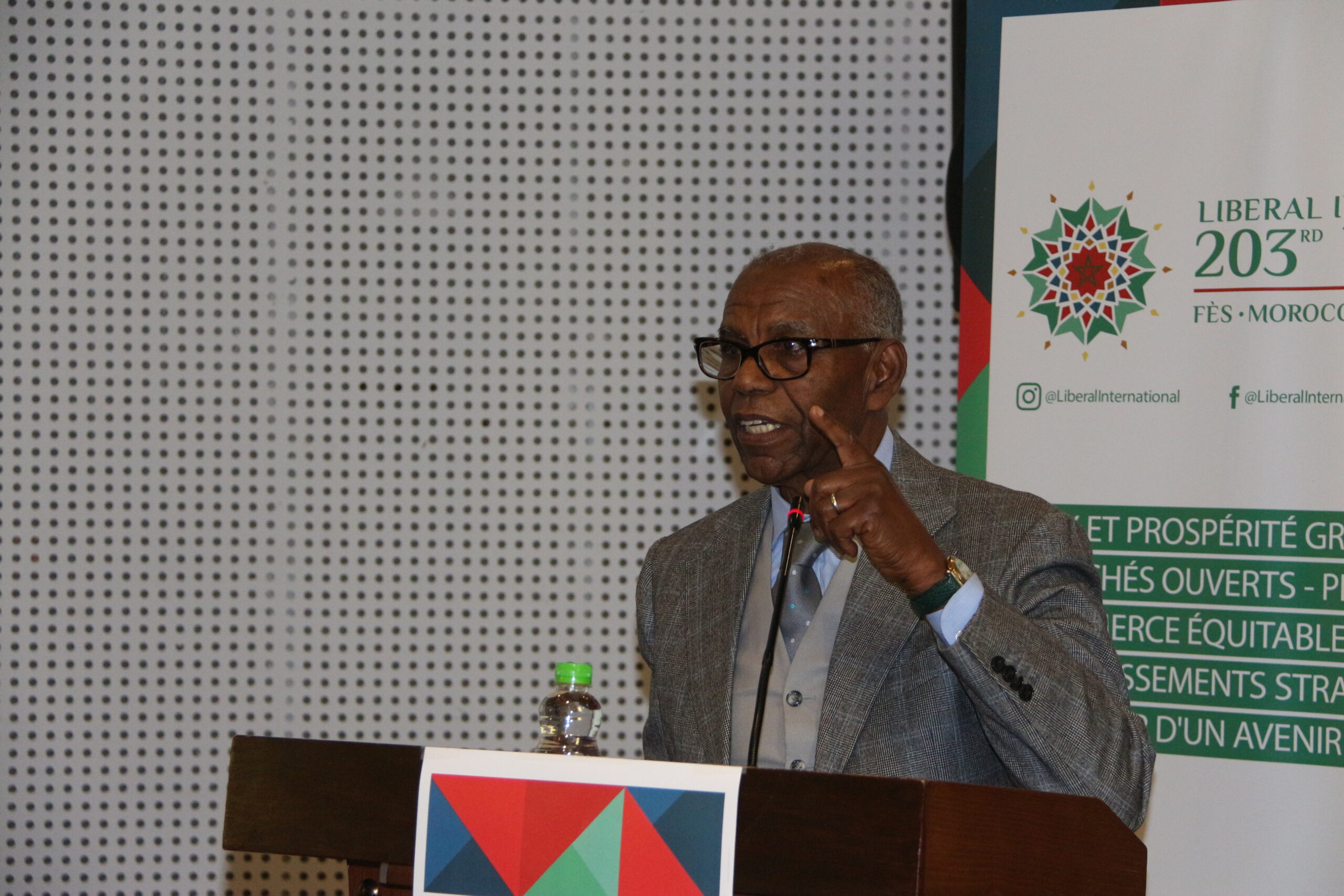
Prof. Mohamed Tamaldou, the first promoter of Liberalism in Morocco and of the other Moroccan Liberal Party, Union Constitutionelle, addressed the delegates and guests: “Morocco has hosted LI events on 3 occasions. I am happy to be here in Fès at LIEC Fès because this meeting is headed by a Moroccan woman who calls for freedom.” In the Arabic world a women president is rare. In Africa the level of freedom is different from the international. We need to translate liberal concepts such as freedom. It is still seen as revolutionary; we are developing a work plan to find a root of liberal thinking in our culture. This is most important”. “The linking between what we want and what we can do with liberal conventions is very often not translated into the Arab world. Many famous books written about freedom and liberalism cannot be read by most of the people of the Arab world. The Arab world must change its concepts of liberalism and the traditions of Islamic world. Liberalism is like a Moroccan dish in which you can put many different ingredients, we need different ingredients to get great Moroccan liberalism”.
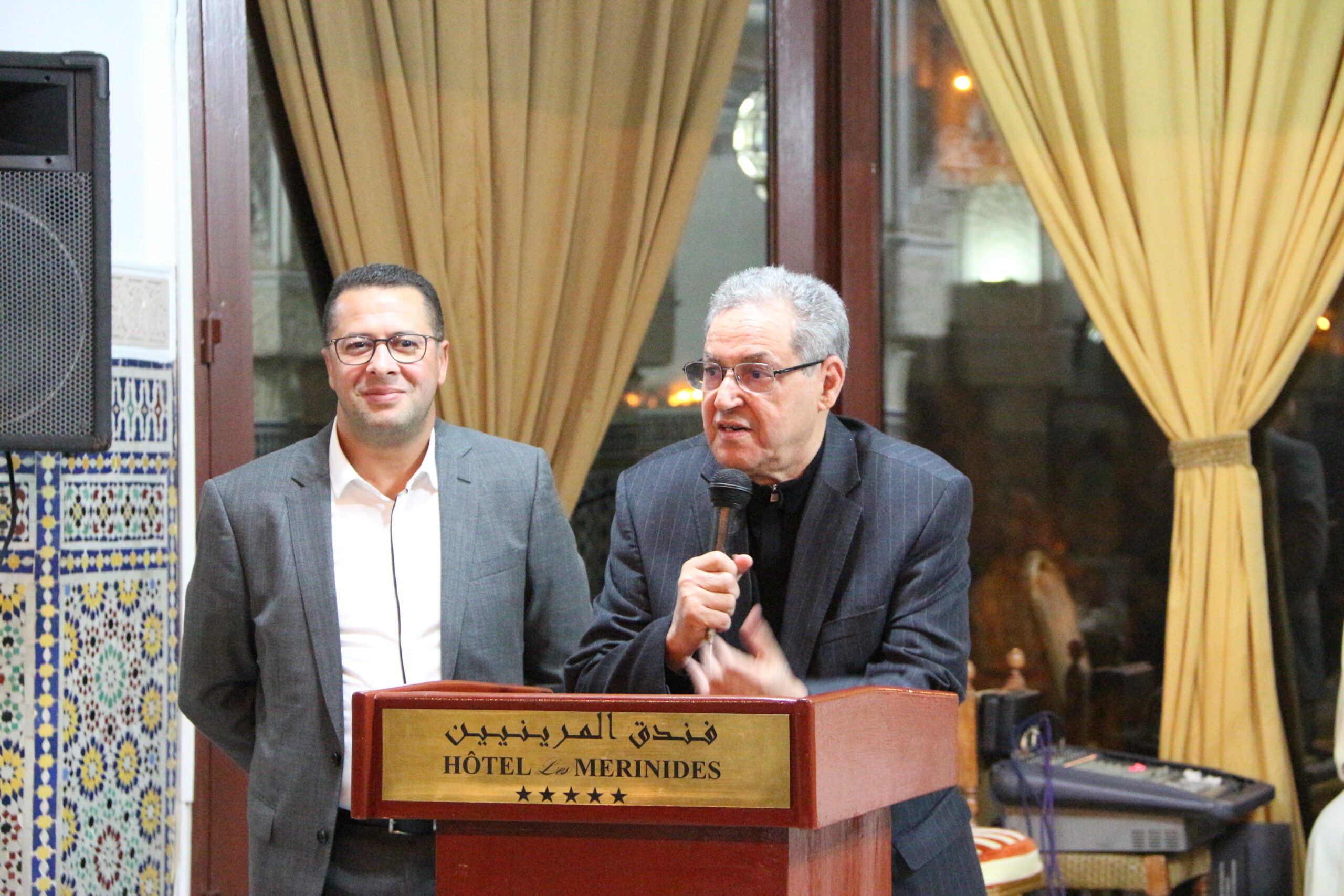
He was worried that the world is changing shape. We are living in a critical period, where diplomatic leadership and multilateral conventions which brought us economic stability are dying. Diplomacy is being taken over by Populism and the might of money is taking over from multilateralism. We must together save Democracy which faces many challenges like that of the flows of migrants.
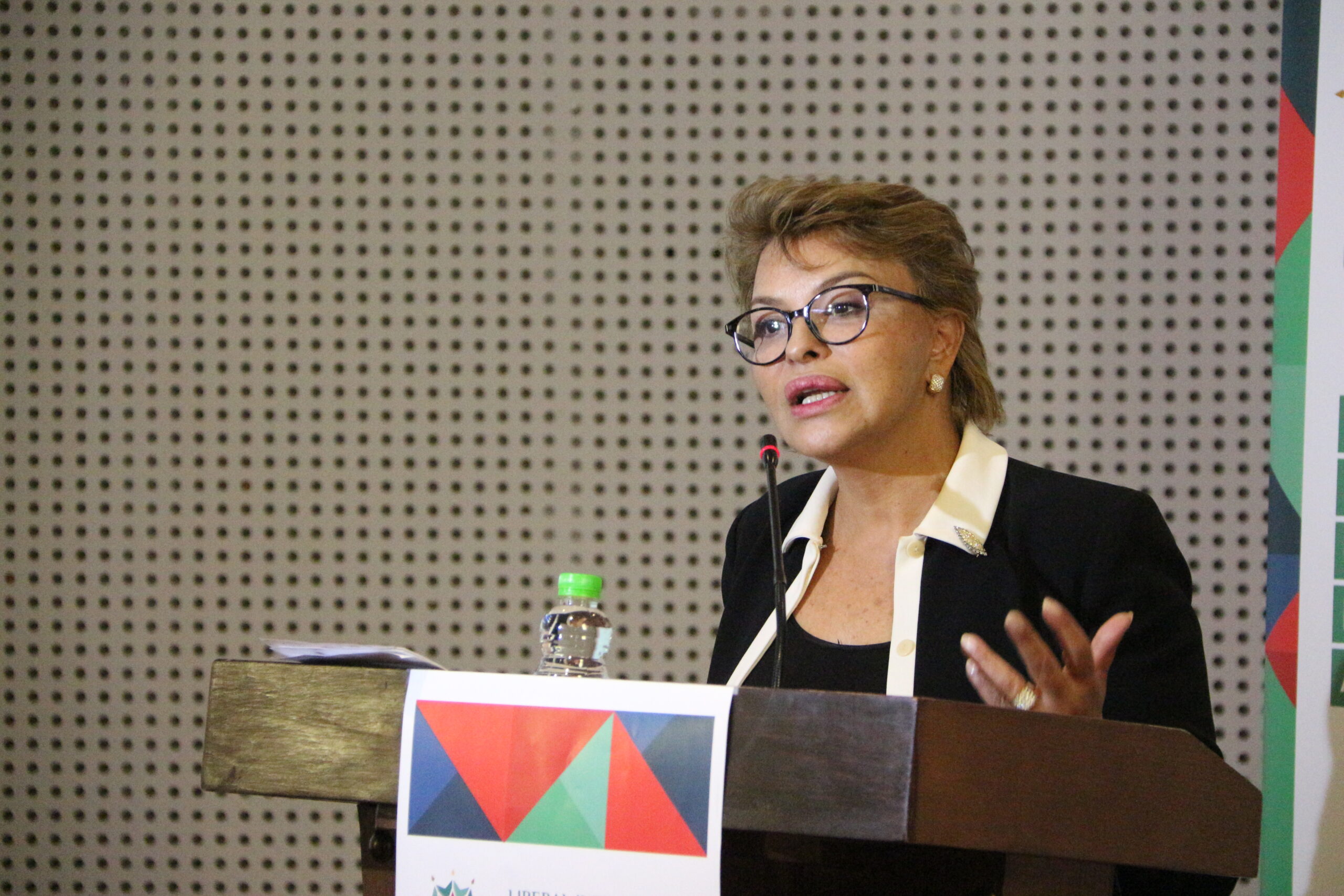
Mohand Laenser, secretary general of Mouvement Populaire, also reminded us of the oldest university and the culture here in Fès. He said: “We must explain liberalism and must stay away from populism. Many people in Morocco only know the negative side and not the values we are working for. After 1956 and the independence of Morocco a mulitiparty system was started and in this way tolerance all over grew. Now we want to see progress also for the women. Despite religion, which is still very dominant in Morocco, there are quite a few women visible everywhere.
Now there is a lot of unemployment and much protest. There is a huge difference between the city and the country. Most of the problems must be solved in the local community and money is needed to get this done. Also, the right of women and children must be protracted, as countries we must help each other. Defending liberalism needs courage in the Arab world. In 1992 there were 2 women in parliament. One of them came from Fès. 2011 there were 67 women, in 2017 81 women in parliament (21%) which consists of 395 members. Investing in women is important, women are different in their perception and priorities and the way they want to implement things. This can make a better balance. The women issue is a social issue and a worldwide problem, they also get paid less. We as liberals must set an example also in our parties.
The WIPP (women in political parties) inclusivity handbook that is introduced during this meeting must be shown every year to show us the progress. Astrid Thors, LI vice president, underlined the importance of the handbook. We must implement equality within our parties. The WIPP was set up for a large part by Tamara Dancheva, consultant for Liberal International. She gave us more figures. Worldwide there are 24% women active in politics. 11 women are heads of state and 12 women are heads of government. In Sweden 60% of the politicians are women since the latest elections. With more women you can make society more inclusive. Also, elections cannot be won without women. New votes can come from women voters. Without data you cannot get a good insight of the progress. One of the problems in politics is the harassment that is met by female politicians.
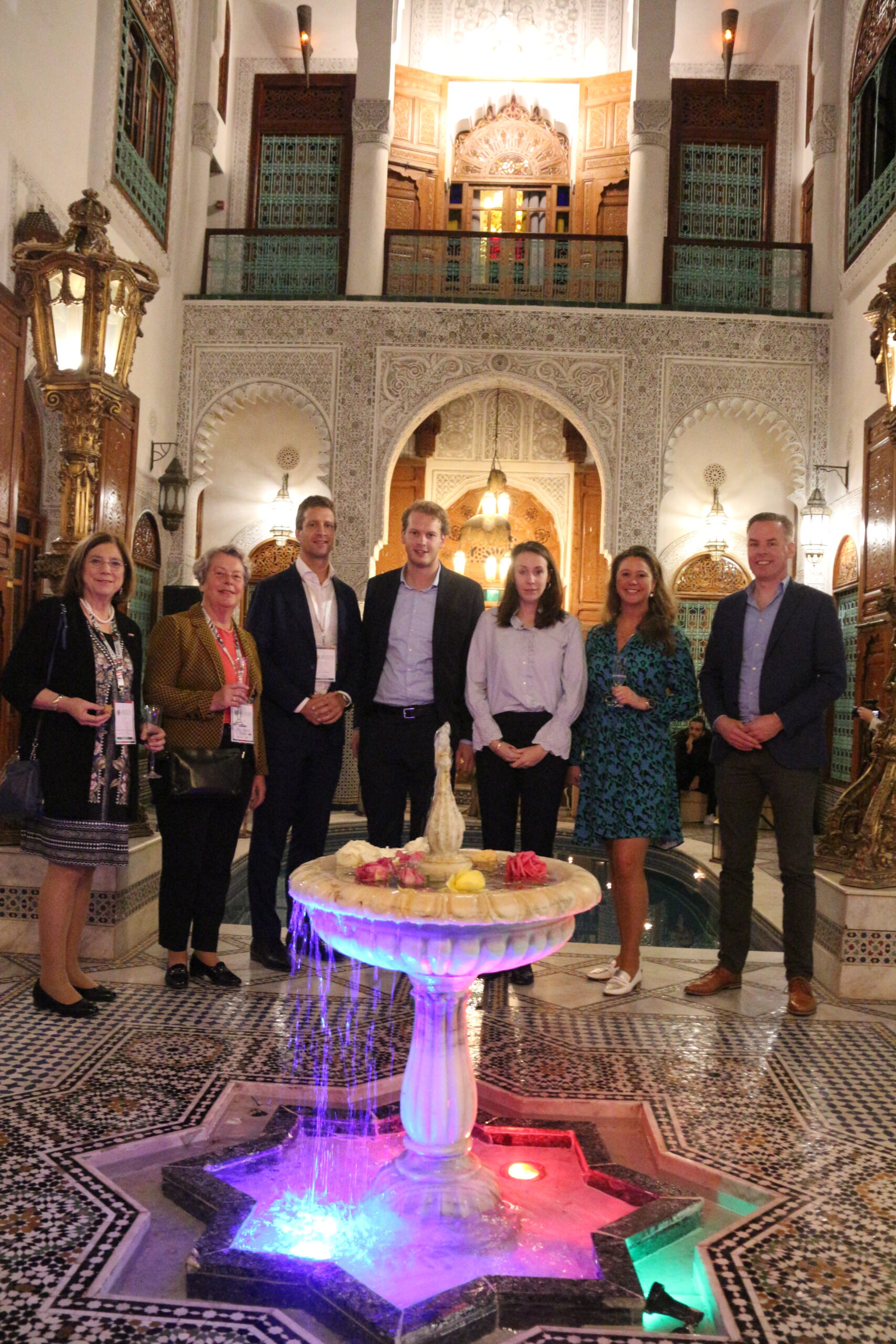
During the executive committee meeting the former UN High Commissioner for Human Rights Prince Zeid Ra’ad Al Hussein was awarded the LI Prize for Freedom for 2020.
In the evening we had a wonderful dinner at the Riad Arabesque in the middle of the Medina.
On Saturday important resolutions were accepted during the meeting such as urgency resolutions on the situation in Cambodia, Catalonia en Hong Kong and others such as one against gender-based violence (see website LI).
Mr Cellou Dalein Diallo who is the leader of the official opposition party in Guinea and former Prime Minister from 2004 till 2006 and elected Vice President of LI in Andorra in 2014 told the Ex Com meeting that he is currently running for President in Guinea. He is hoping for support of LI members as the current President Alpha Condé wants to stay on for an unconstitutional third term. This has brought about a peaceful manifestation of 2 million people, but later demonstrations were held in protest which have been met with military force. Mr Diallo is afraid that the election will not be held or if it is held that it will be held in a lawful manner. He hopes he will survive it all. LI will follow the developments closely.
The Human Rights Committee held its administrative meeting, in which the different working groups reported on their work and plans.
The LI HRC Priority working areas will be:
1.Women’s Political Empowerment;
- Digital Space and Human Rights and
- Defence of Civil and Political Rights/ Countering the Shrinking Democratic Space around the world. In 2020 the HRC will take part at the Geneva Summit for Human Rights on February 18th. Margaret de Vos participated as member of the LI HRC on behalf of INLW
The next Liberal International 63rd congress will together with our parties and partners MRF and LIBSEEN, will convene in Sofia, Bulgaria on 25-28 June 2020.
During that congress INLW will hold its next General Meeting.
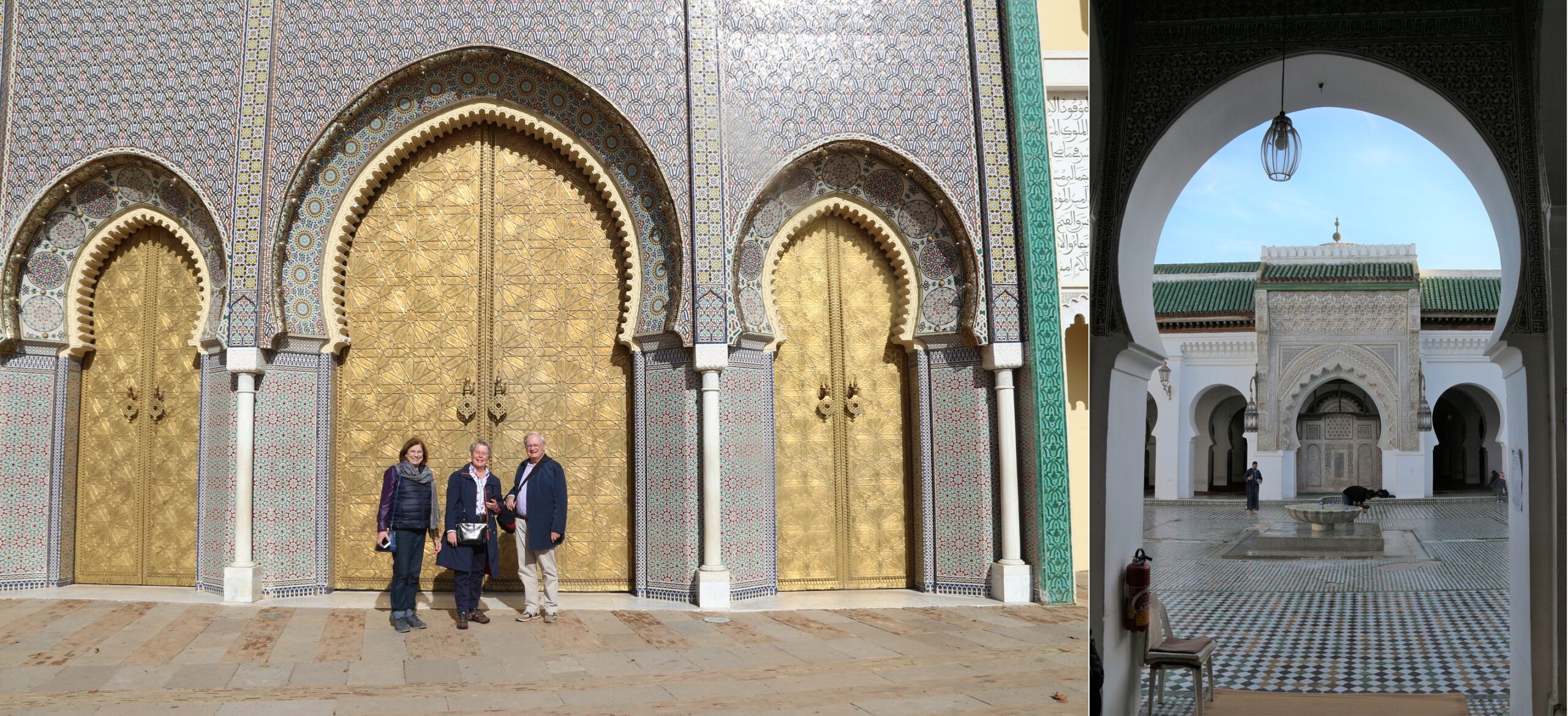
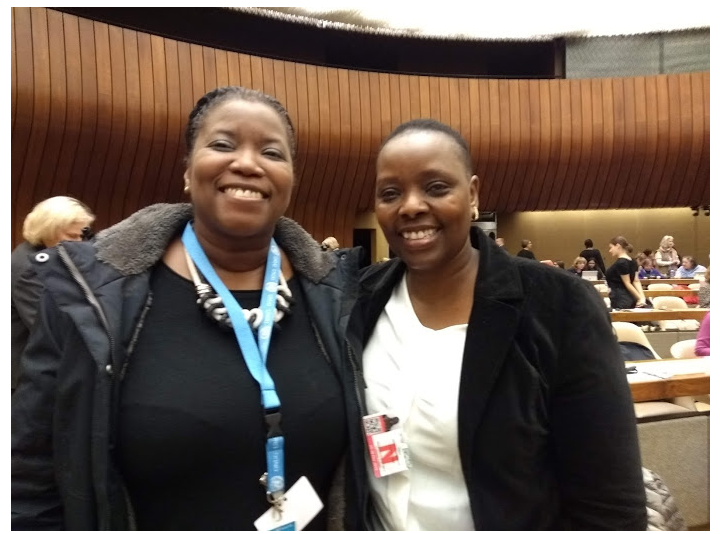
INLW board member Ruth Richardson attended the UN Gender Equality conference in Geneva in October. A short up date.
Several Committees from around Europe held an exchange of views focused on parliamentary actions aiming at:
• the promotion and protection of Women’s rights around the world,
• equal opportunity policies,
• Women in Leadership as well as
• the implementation and advancement of gender mainstreaming and
• Elimination of Violence against Women.
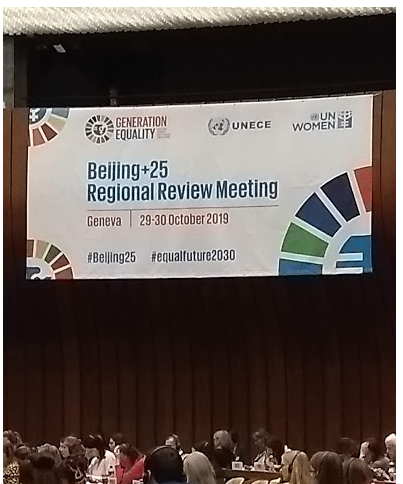
Violence against women – be it physical, mental or structural – is a fundamental violation of human rights. And it is the result of fundamentally unequal distribution of power and resources in our society. Therefore, there is still a long way to go.
I am convinced that if women are economically independent, it also makes them more independent in their relationships.
Furthermore, several European Commissions delivered the next Gender Action Plan;
• incorporate the gender dimension in all sectors of the EU external action and
• recognize and respond to the global backlash against women’s and girls’ rights.
It also calls to focus on trafficking in women and human beings, more systemic actions against gender-based violence and provide systemic support to women’s rights organizations and women’s rights defenders, among others.
Gender equality is a right. Fulfilling this right is the best chance we have in meeting some of the most pressing challenges of our time—from economic crisis and lack of health care, to climate change, violence against women and escalating conflicts.
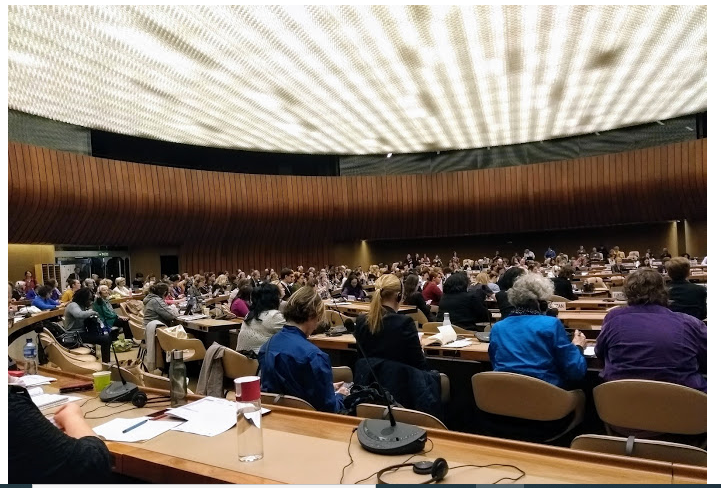
UN Women calls on everyone woman, girl, youth and man to come to the Commission on the Status of Women, CSW64/Beijing+25 March (9-20) 2020 in New York.
The focus of the session will be on the review and appraisal of the implementation of the Beijing Declaration and Platform for Action and the outcomes.
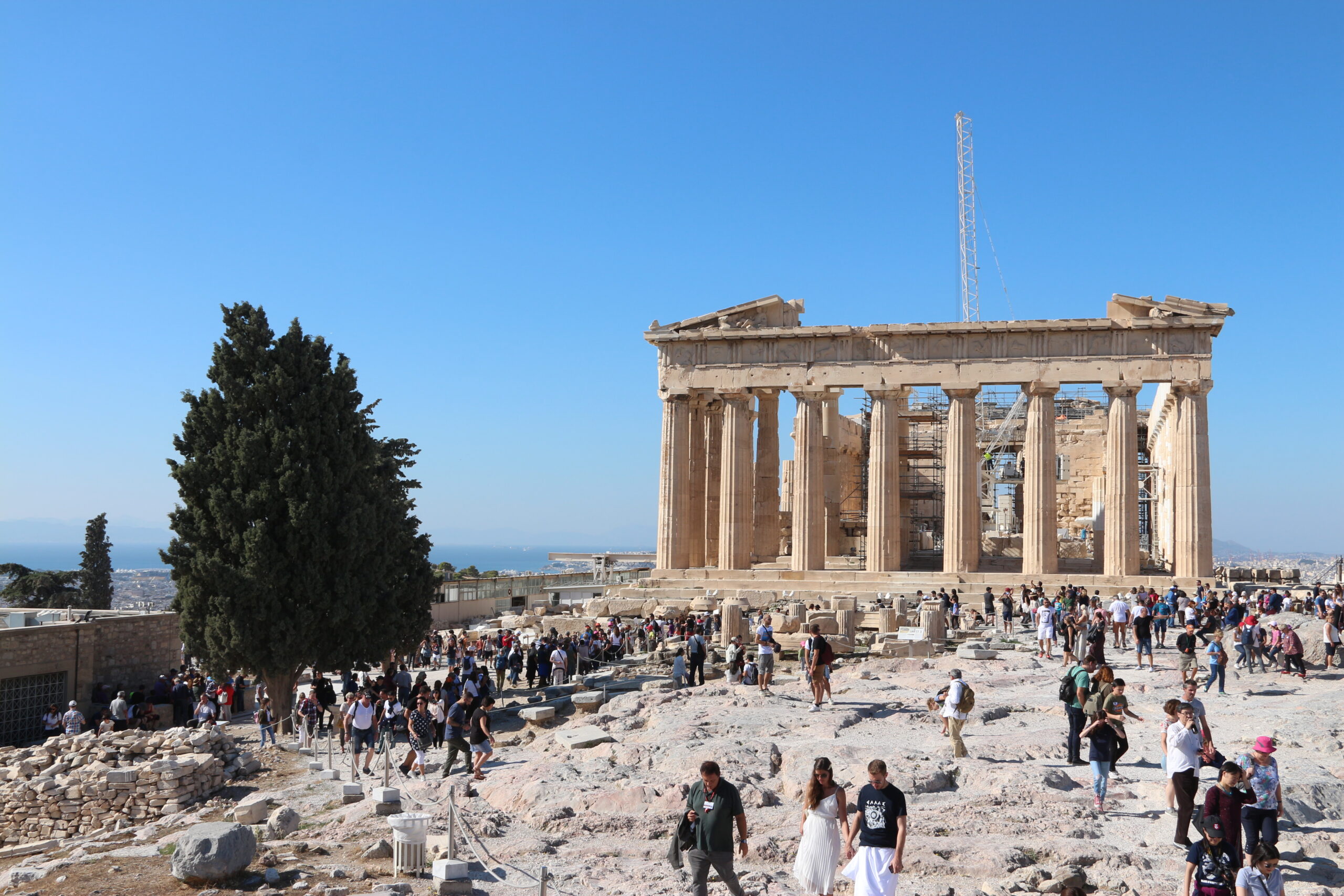
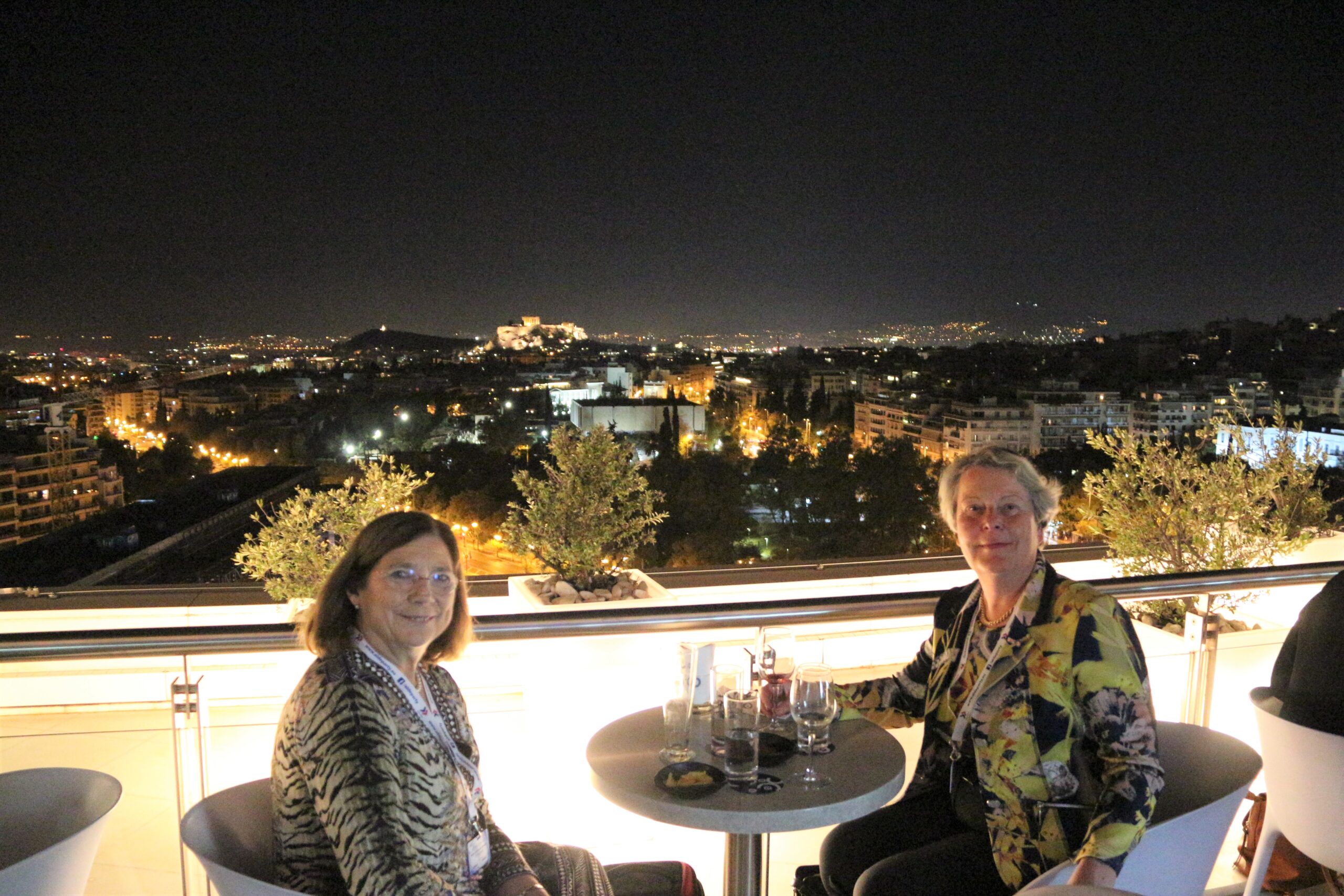
This year the ALDE party met at Athens for its congress. The European Liberal Democratic political family was founded in 1976 ahead of the first European elections and was established as the first true transnational political party in 1993. Today the European Liberal family consists of more than 60-member parties across the continent and more than 80 members of the European Parliament. Since November 2015, Hans van Baalen has been President of the ALDE Party.
ALDE MEPs are members of the new Renew Europe Group in the European Parliament and with 108 MEPs they are the third-biggest group in the European parliament. Last year at the congress in Madrid, Astrid Panosyan, one of the co-founders of La Republique En Marche (LREM) spoke on behalf of its leader Emmanuel Macron and made the commitment to work closely together in the new European Parliament with us. Today, we see that there is a united parliamentary group under the leadership of Davian Ciolos.
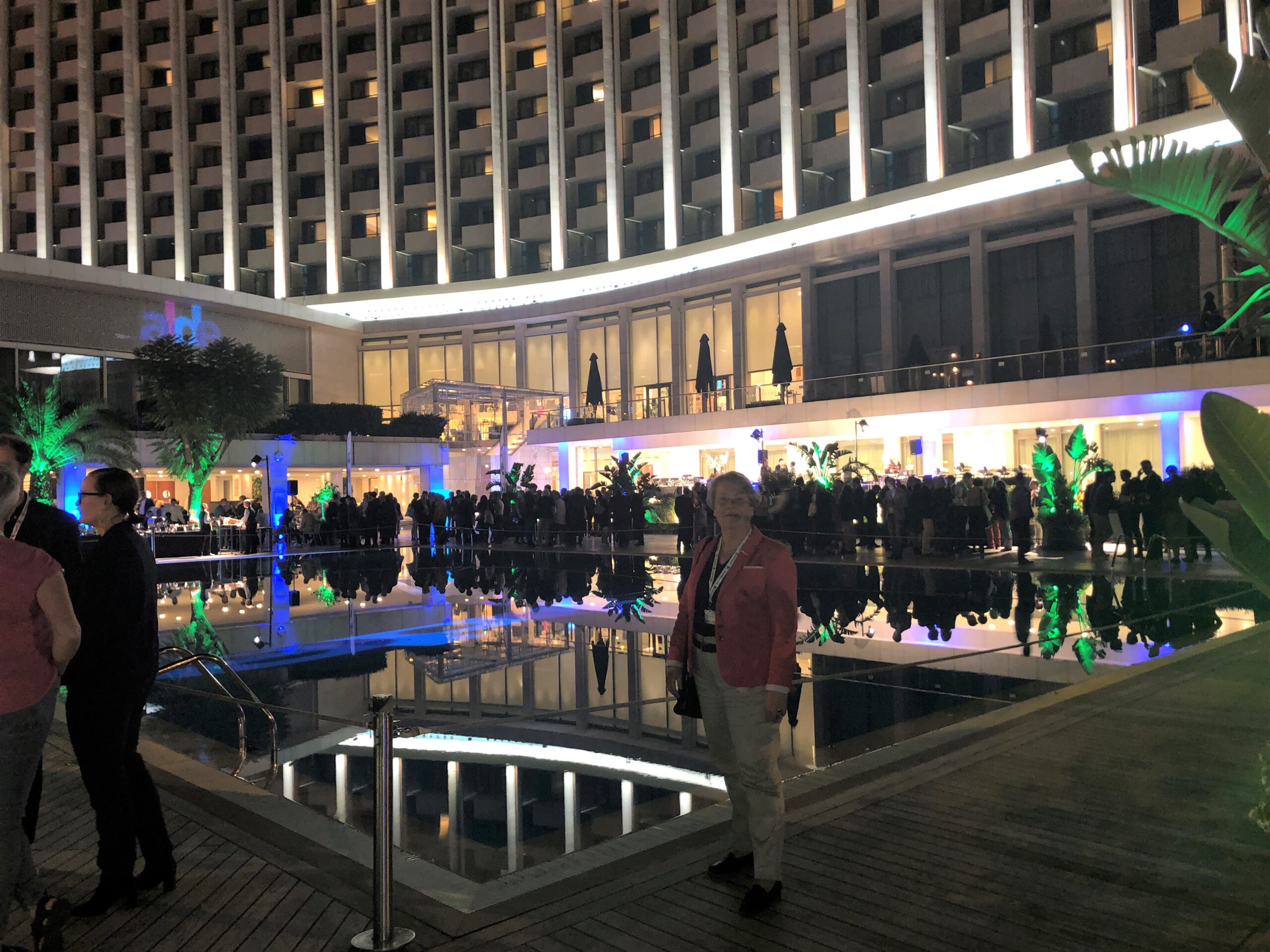
In the evening of our first congress day, Friedrich Neuman Stiftung sponsored the welcome reception/dinner around the swimming pool at the Hilton. During this very nice evening we met all the new parliamentarians who have been chosen in the European parliament and some of the potential candidates for the ALDE Bureau. The next day was started with some workshops and followed by the opening ceremony.
The official opening gave us inspiring speeches from many members.
Hans van Baalen began welcoming us ending his speech with the wish: “let’s unite and let’s go forward together”, followed by Davian Ciolos, the new Renew Europe leader in the European Parliament who stressed on our common values. The Renew Group defends the liberal values actively. Important is creating welfare, while promoting economic opportunities, while mobilizing people. How can we transform challenges into opportunities? To create jobs; to mobilize the young generation to transform Europe and to have open mindedness is necessary to achieve this.
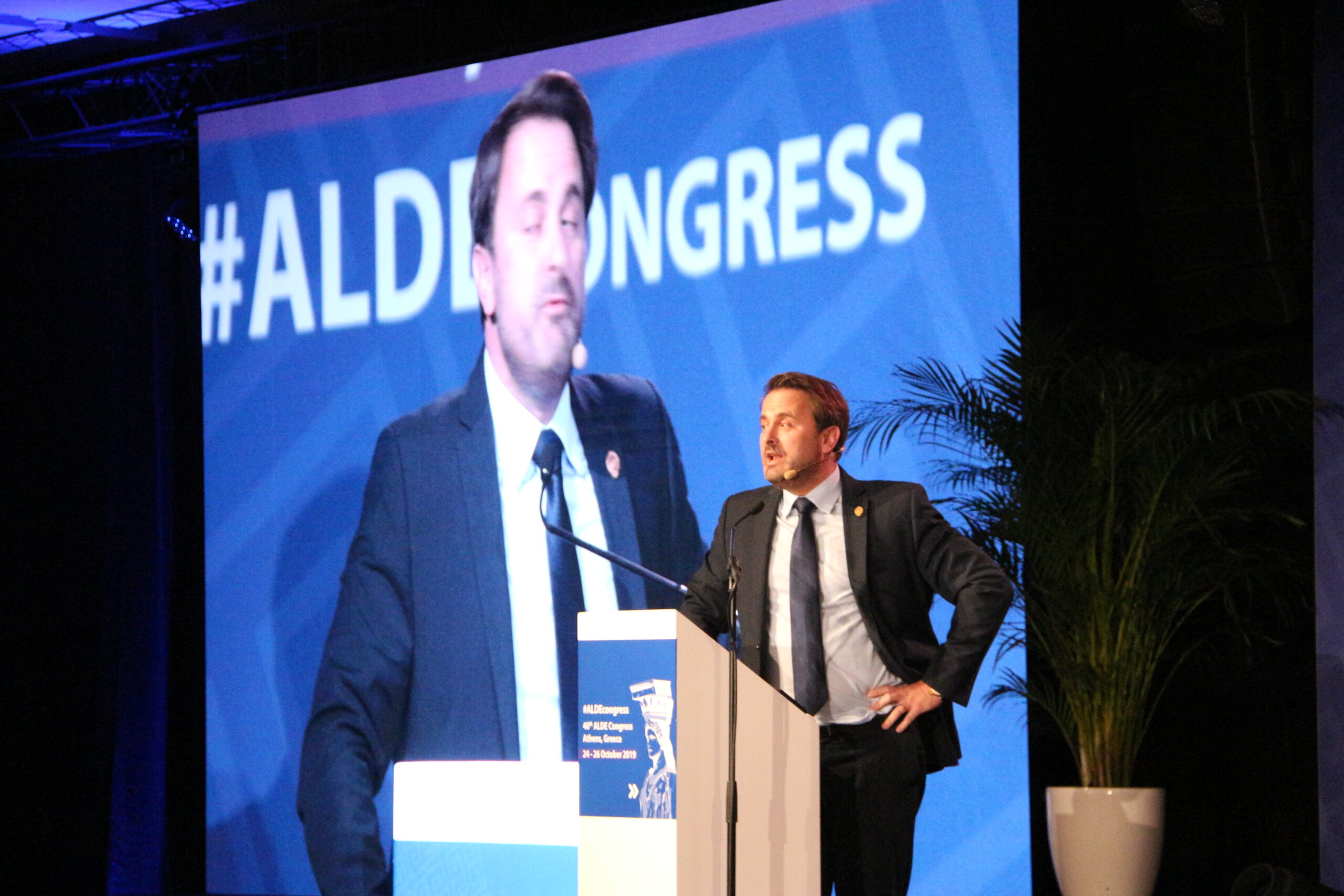
Xavier Bettel, the Prime Minister of Luxembourg, started giving vent to his deep regret about Brexit. He is convinced that if all details about Brexit had been said before the elections, then Britain would not have said no to Europe. He is one of the several liberal PMs and is making some important improvements in Luxembourg. The separation of church and state, legalizing abortion, liberalizing drugs and same sex marriages are some of the new steps that he has taken with his government. He also wants to stress that Europe is a peace project and we must never forget this. That is something we can still ask our grandfathers who were willing to fight for our freedom. He received a warm applause from all participants.
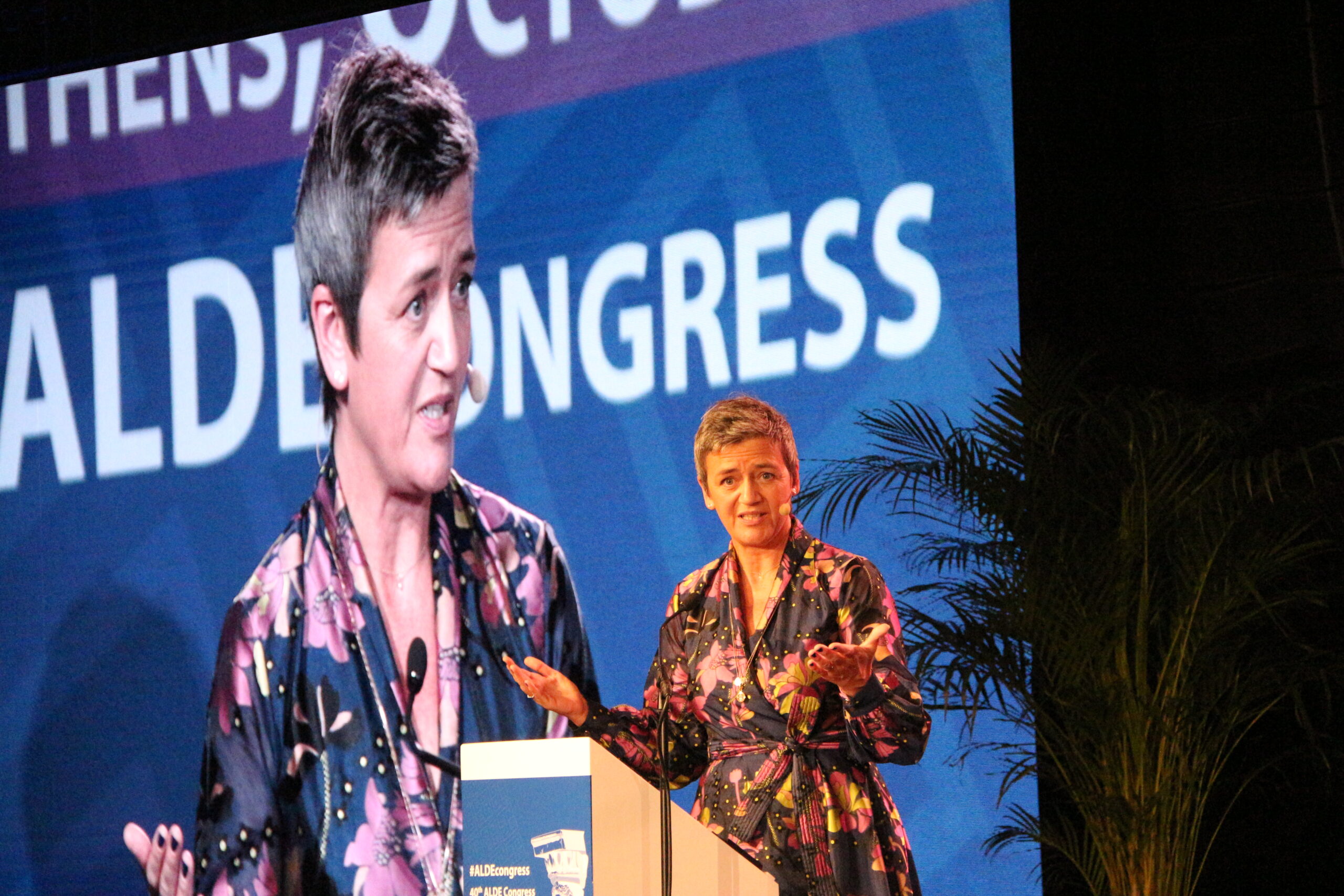
Margrethe Vestager, executive Vice-president of the European Commission for a Europe fit for the Digital Age. She stressed that in this time, it is important to see each other, only digital contact is not enough. It is much easier to have a discussion once you are together in a room. One of the important issues for liberals is, that in a discussion you can disagree and still all belong to the same party, that is part of our liberalism. Of course, we find the rule of law, to act with common sense and to respect each other also very important aspects.
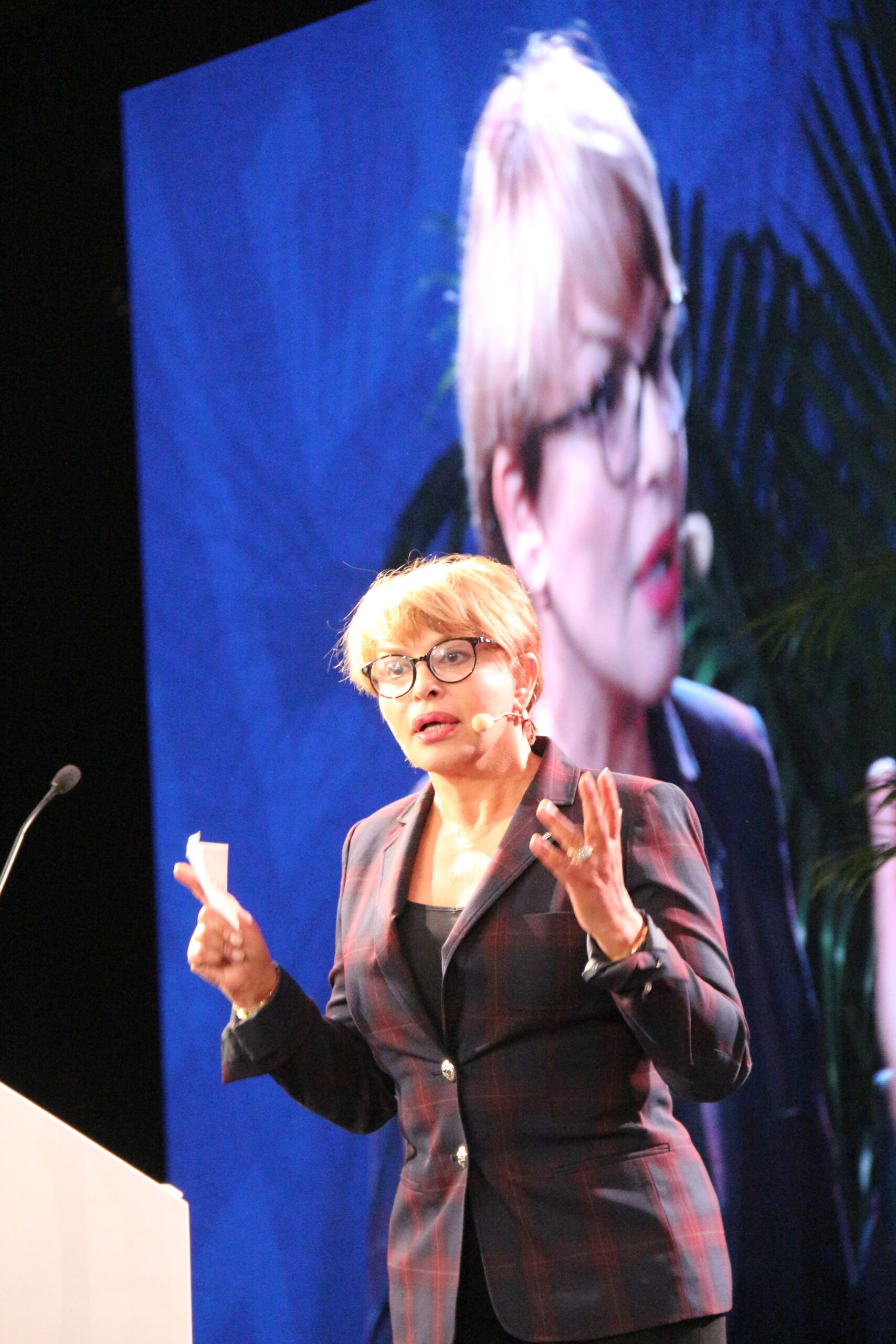
Vera Jourova, vice-president for Values and Transparency. She added to focus on our liberal values such as equality, rule of law and respect. And stressed on the importance of the monitoring of corruption in the media, dis-information, medical freedom and protecting our journalists. They need more legal protection. We must pursue a peaceful and sustainable future. These issues will be important in the European parliament in the next term that has just started.
We will see our liberal MEPs and members of the Commission in their new roles working for our liberal values and for the time being Brexit and the result of that discussion will have much impact on the future of Europe. There was also an inspiring speech by Liberal International President, Hakima el Haiti, stressing that we liberals within Europe and in the rest of the world need each other and must support each other to achieve our goals of a liberal society, especially in the current situation of rising nationalism and populism in so many corners of the world.
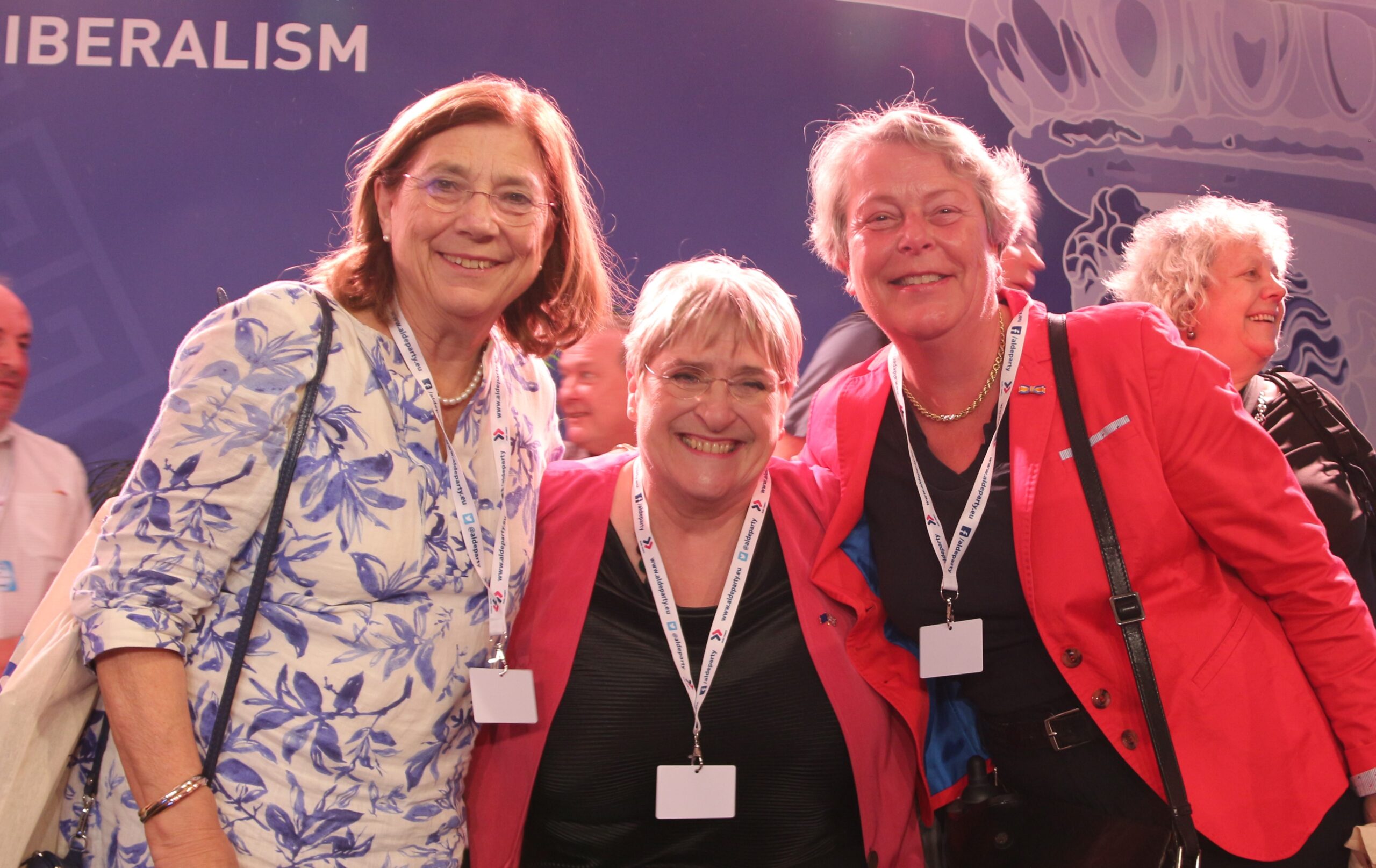
There were many sessions in which all the amendments for the resolutions were discussed. We as member delegates had to be present during these sessions. Not only were the voting procedures for resolutions important but new vice-presidents had to be appointed. So, voting for persons was also one of our issues. One of the candidates was Baroness Sal Brinton. Baroness Sal Brinton will reach the end of her term as President of the UK Liberal Democrats and she finds it a privilege to become a member of the ALDE Bureau. Her motto was: “We need to fight like Liberals to defeat populism and prejudice”.
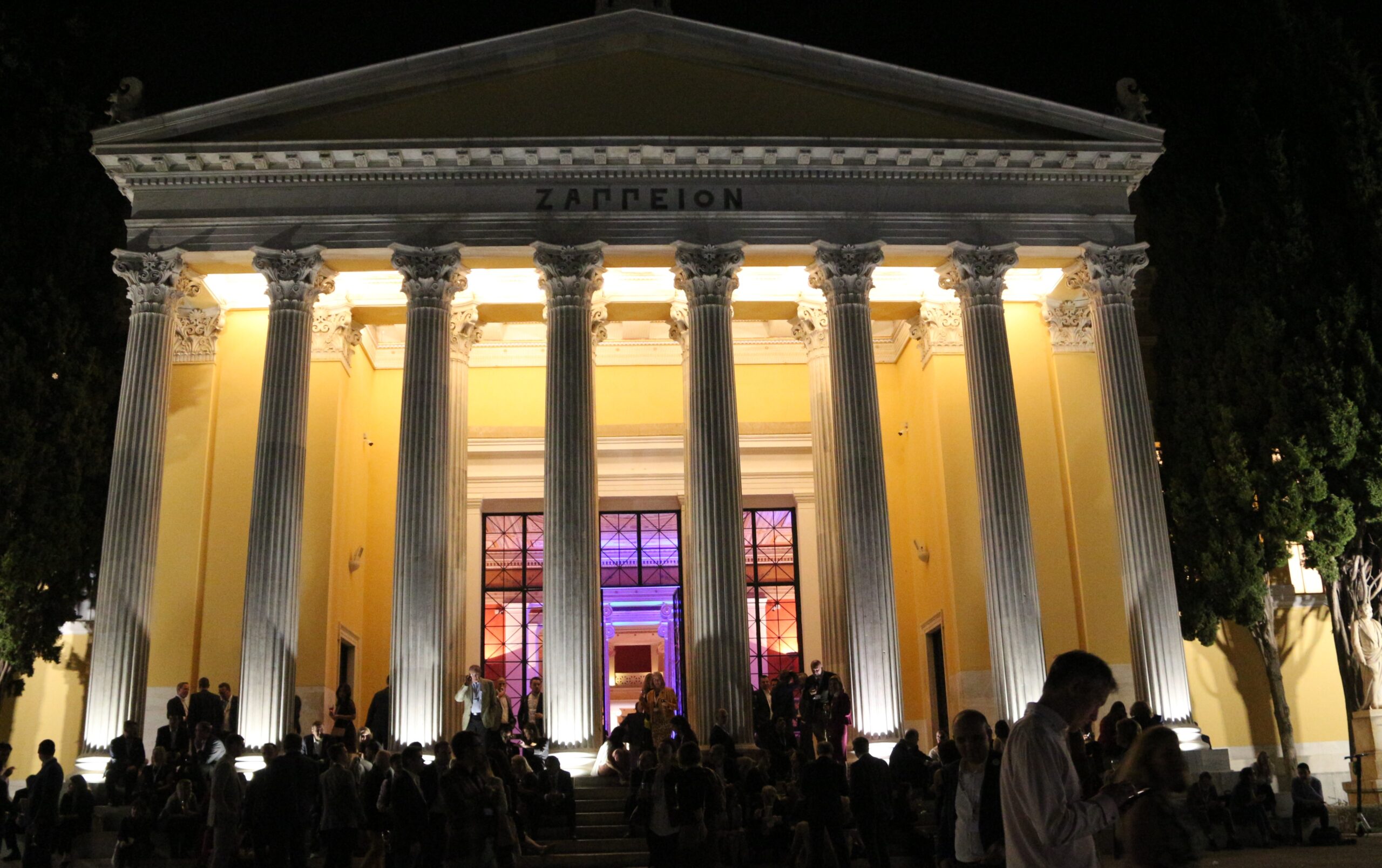
In the evening we were welcomed in one of Athens beautiful palaces: The Zappeion, this building was built for the Olympic Games and used in 1896. Many important events took place such as the official signature of the documents by which Greece became a member of the European Parliament on 1 January 1981.
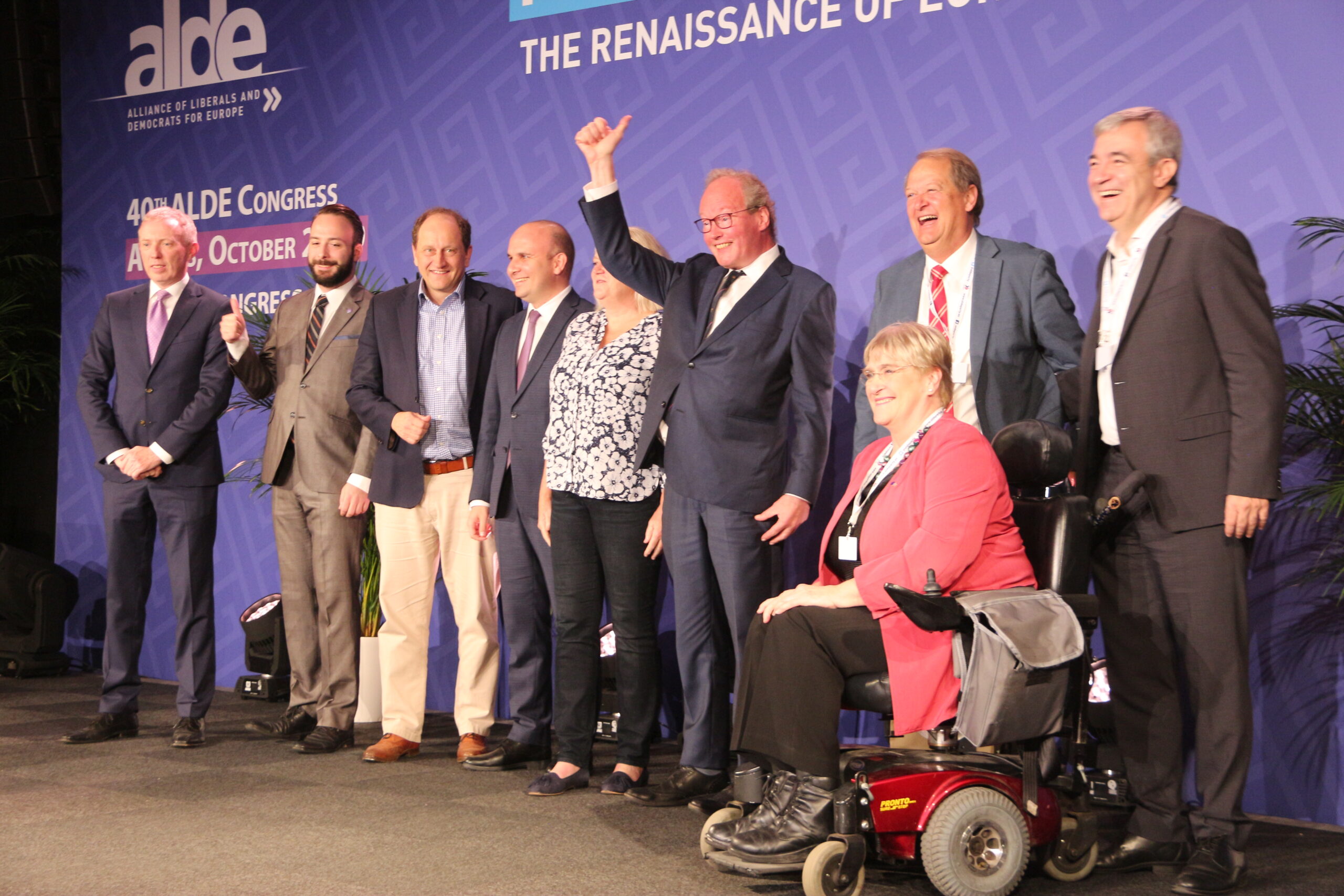
The next day resolutions were accepted and finally the result of the election of the members for the ALDE Bureau was announced. Hans van Baalen was re-elected as ALDE Party President. INLW is very happy to announce that Sal Brinton has been chosen as one of ALDE’s new vice-presidents. The other new members chosen are: Alexander Graf Lambsdorff (Germany), Annelou van Egmond (the Netherlands), Ilhan Kyuchyuk (Bulgaria), Timmy Dooley (Ireland), Daniel Berg (Hungary).
It was again an interesting and pleasant meeting where many of our liberal friends were present. Many of us will follow the discussion on Brexit even more closely and hope that this important issue will be solved at the end of January 2020.
Next year in 2020 the ALDE congress will take place in Stockholm, Sweden.
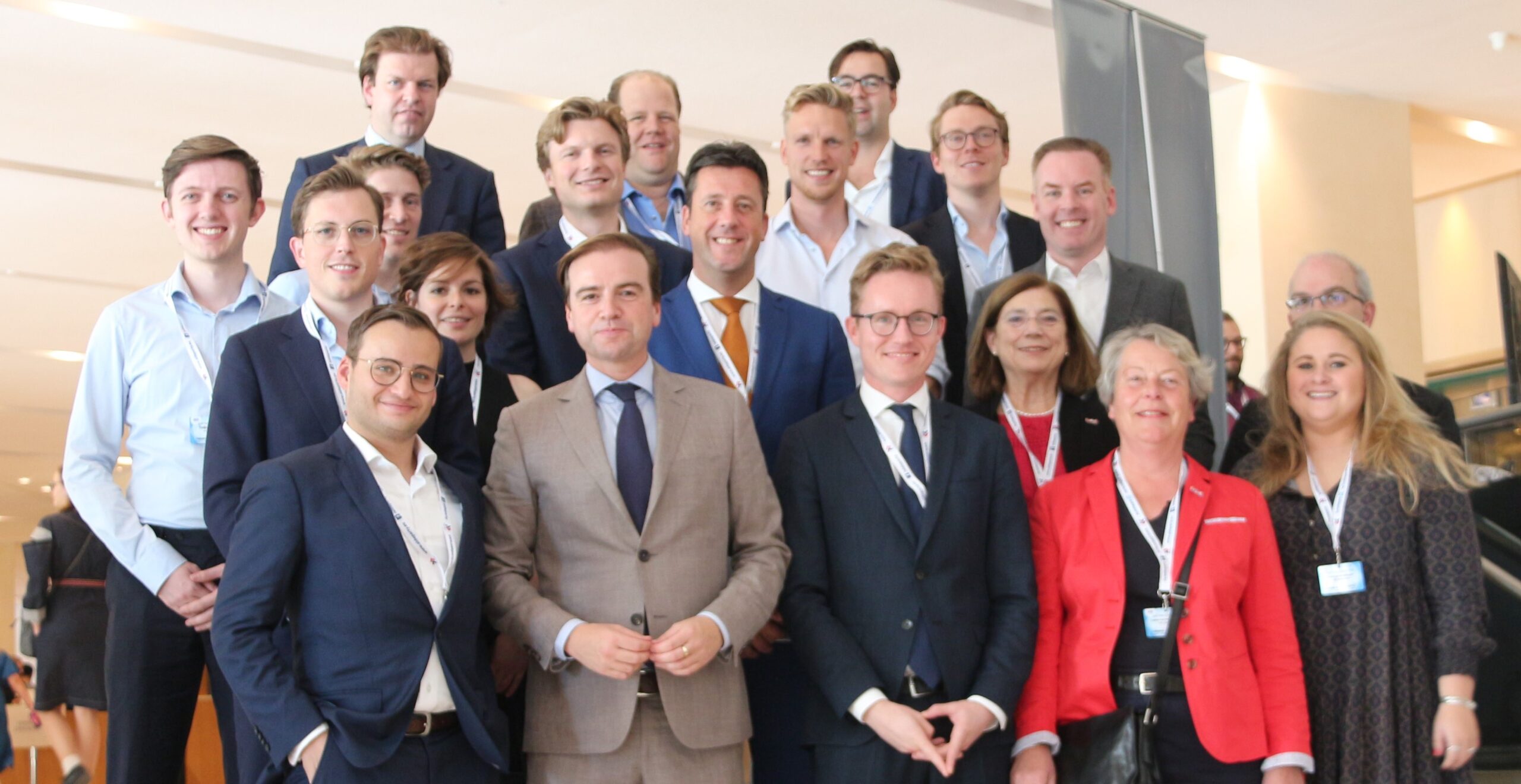
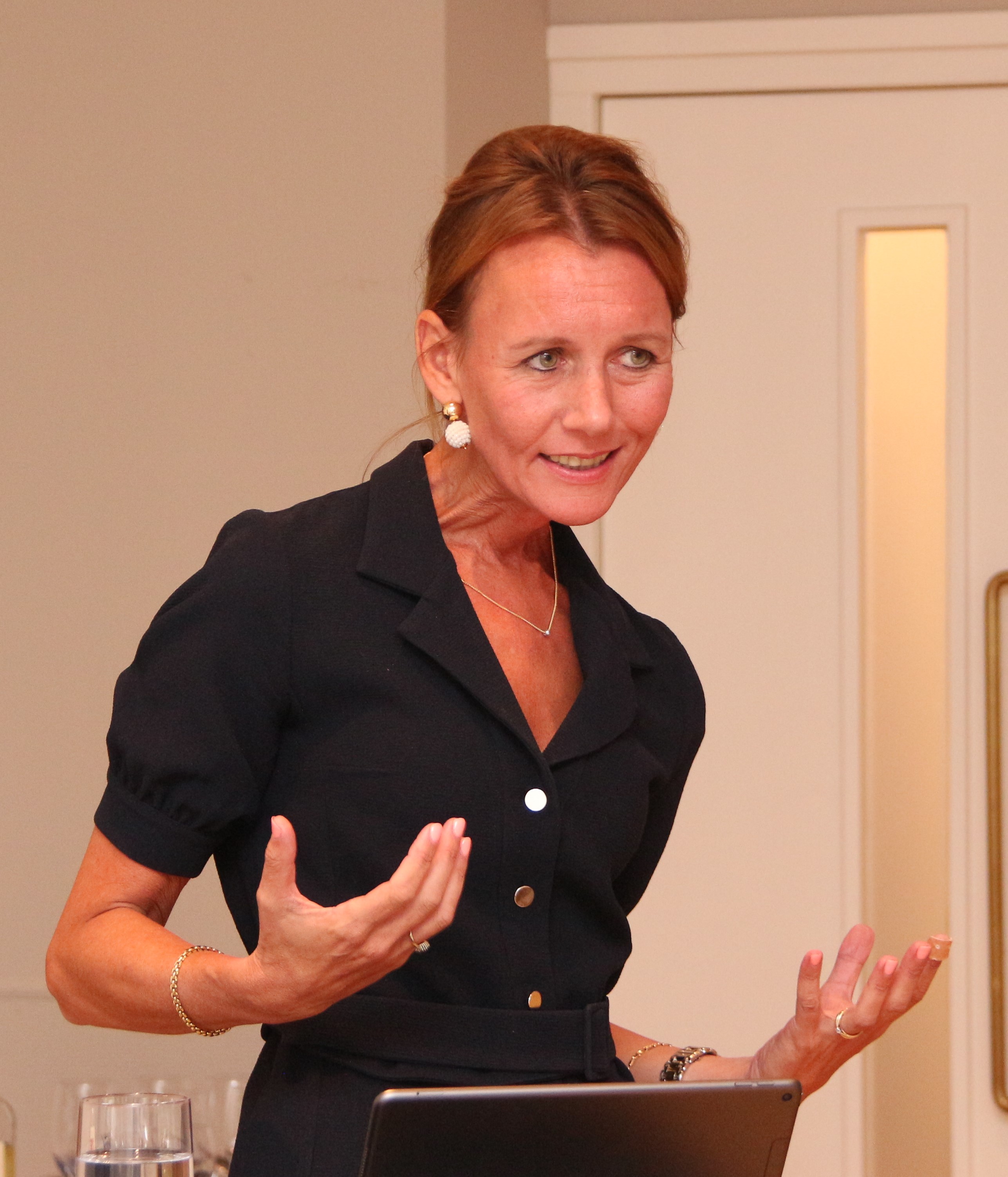
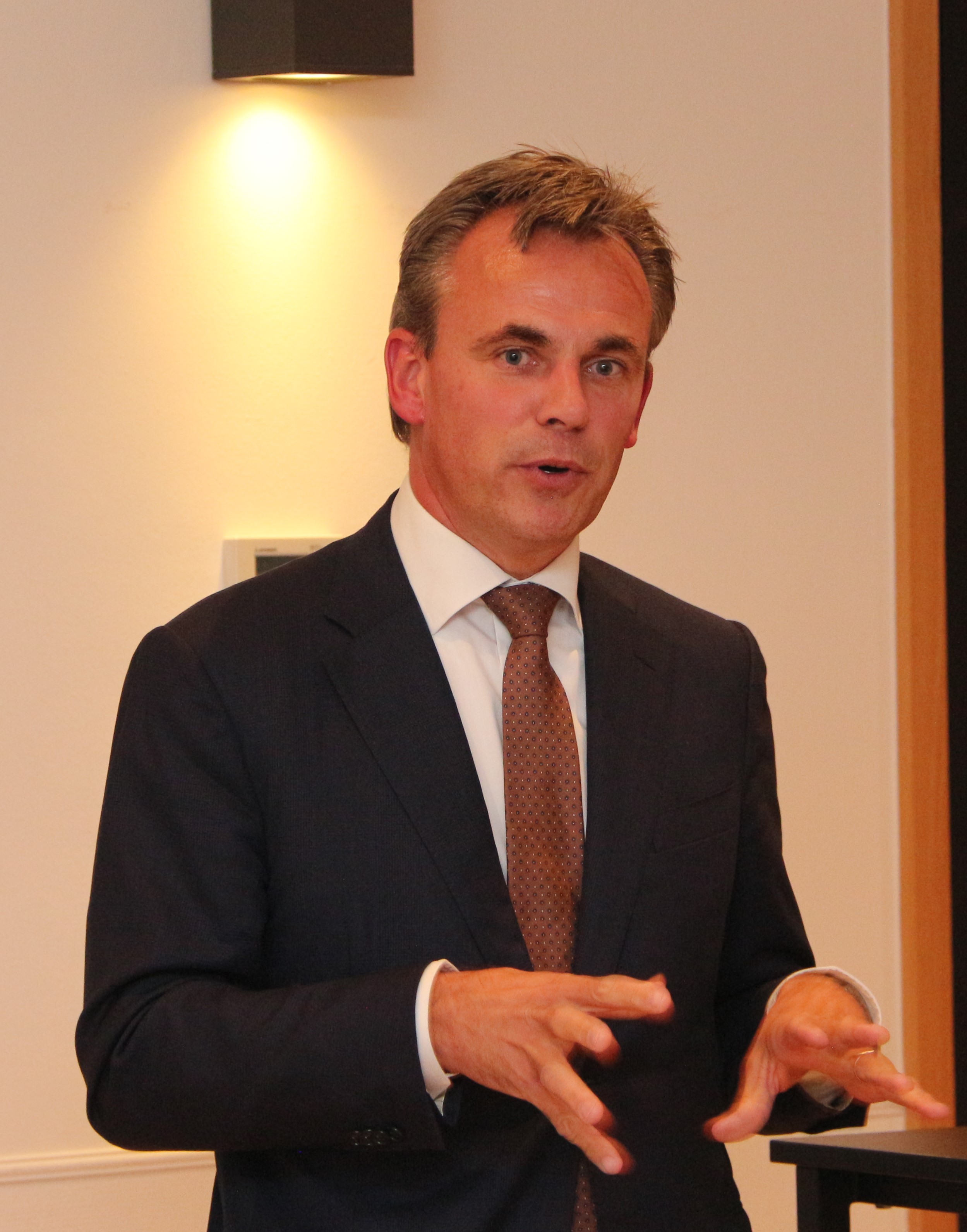
The International Network of Liberal women and the Liberal Women Netwerk enjoyed a well-attended dinner on September 2nd, 2019 in Rotterdam. Guest speakers were VVD member of Parliament Mark Harbers, he has just returned as a representative to Parliament after resigning from his post as Minister of Migration and ALDE Member of the European Parliament, Caroline Nagtegaal. The ladies were vastly interested in the present works in the European parliament with the upcoming new EU Commission and the difficult position of Great Britain. What is going to happen concerning Brexit?
Caroline Nagtegaal, who has the portfolios, trade, transport and economy, gave us a good insight of the various decisions that must be made in the very near future concerning the EU and its members. In the meantime, we still don’t know what the British will decide on the Brexit issue.

That was the link to Dutch member of Parliament, Mark Harbers who has taken up a new portfolio on Climate Change. That will involve not only Dutch laws and actions but also European coordination and technical development. This will be an interesting challenge for both members of the two Parliaments. They are both eager to face and pick up these new challenges!
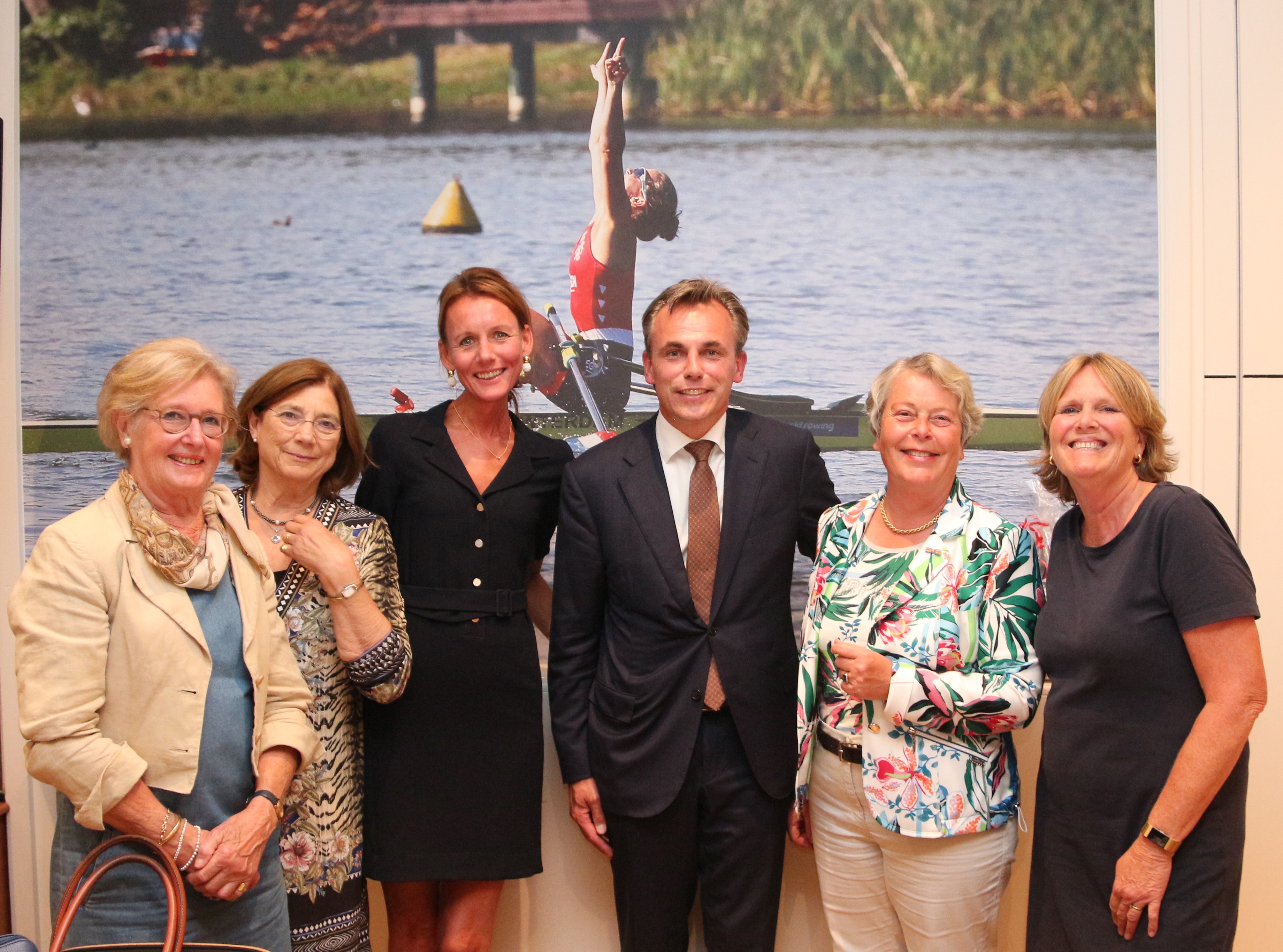
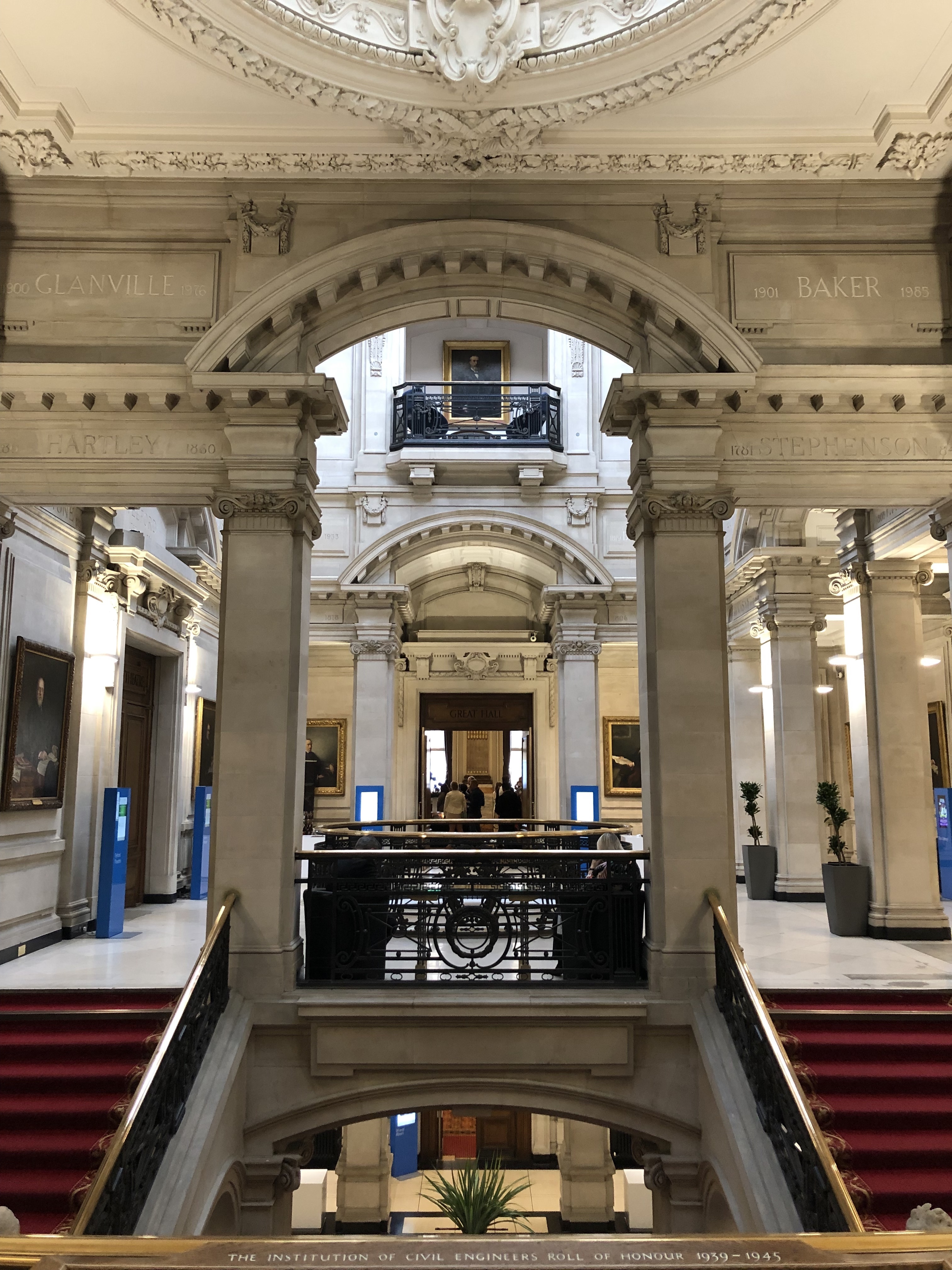
I NLW board members, Margaret de Vos van Steenwijk-Groeneveld and Lysbeth van Valkenburg-Lely were participants during this meeting. At the impressive Institute of Civil Engineers, we were present at the opening by Hakima El Haité, President of Liberal International.
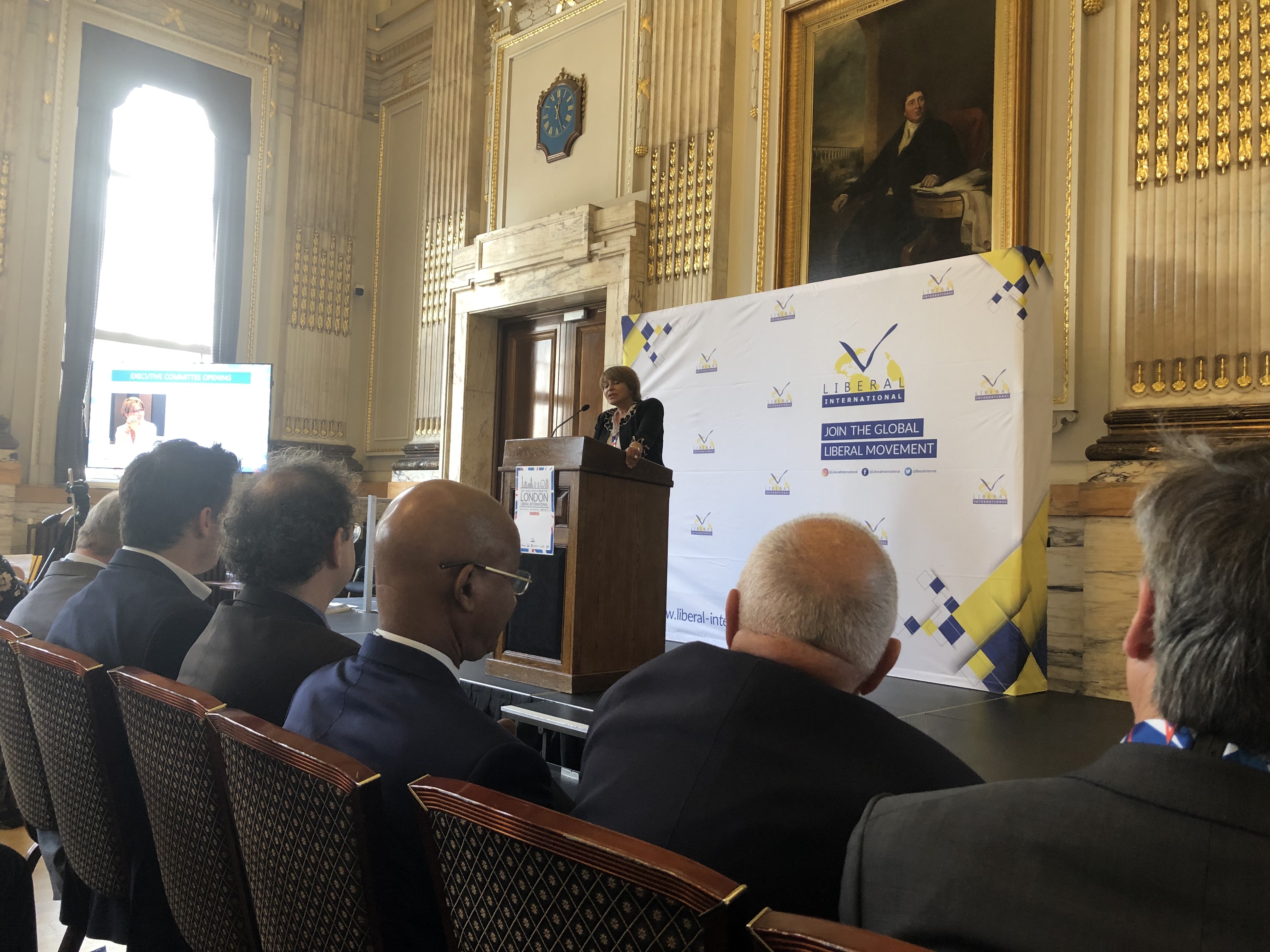
Hakima El Haité gave us food for thought; “the importance to fight for freedom and for climate justice all over the world is a new challenge for all of us. We must reform our organization into a movement and help each other. People from all over who believe in our values and our constitution are very welcome”’ The partnership in the programmes of VVD, ALDE, FNF and our friends in SENEGAL will enhance to build Liberal International and make our values a daily reality. “Reactive, responsive and aggressive are the words for our communication. Good communication is a tool to democracy and our values and a weapon to answer populism. Share our activities via phone and other means”.
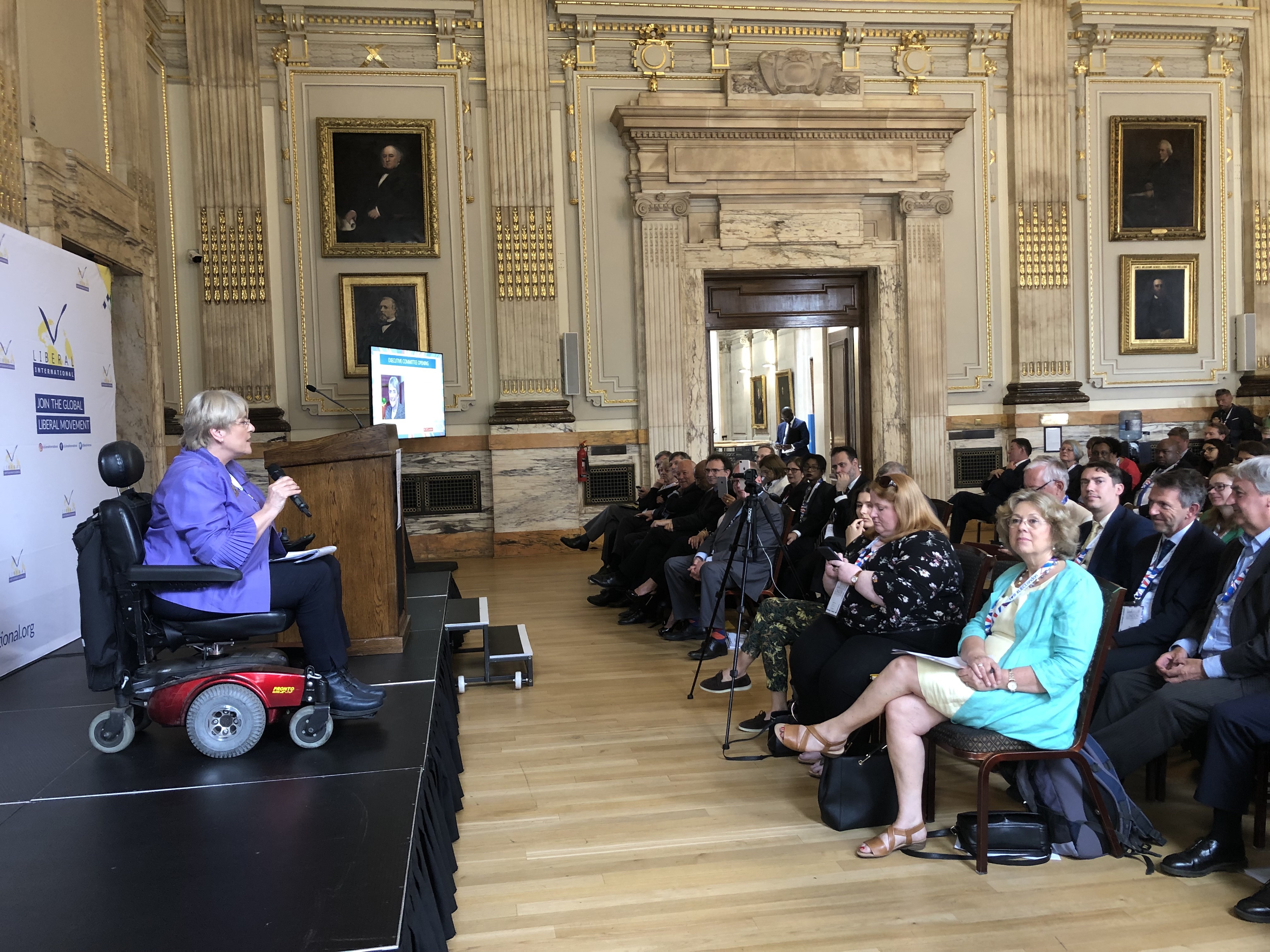
Hans van Baalen gave us some positive news about the new group of President Macron in the European Parliament. The cooperation between the liberal parties is going well. Alde will remain member of LI. “We Liberals must give our own story ‘. ALDE together with the new group of Macron, “En March” now form the group “Renew Europe” and together we have 108 seats in the European Parliament.
Rt. Hon. Baroness Sal Brinton, President of Liberal Democrats, underlined the importance of our liberal values and possibilities for responsibility in government. “We must all fight like a liberal . We have the courage of our convictions. We are talking about new politics where the Lib.Dem might be leading in government”
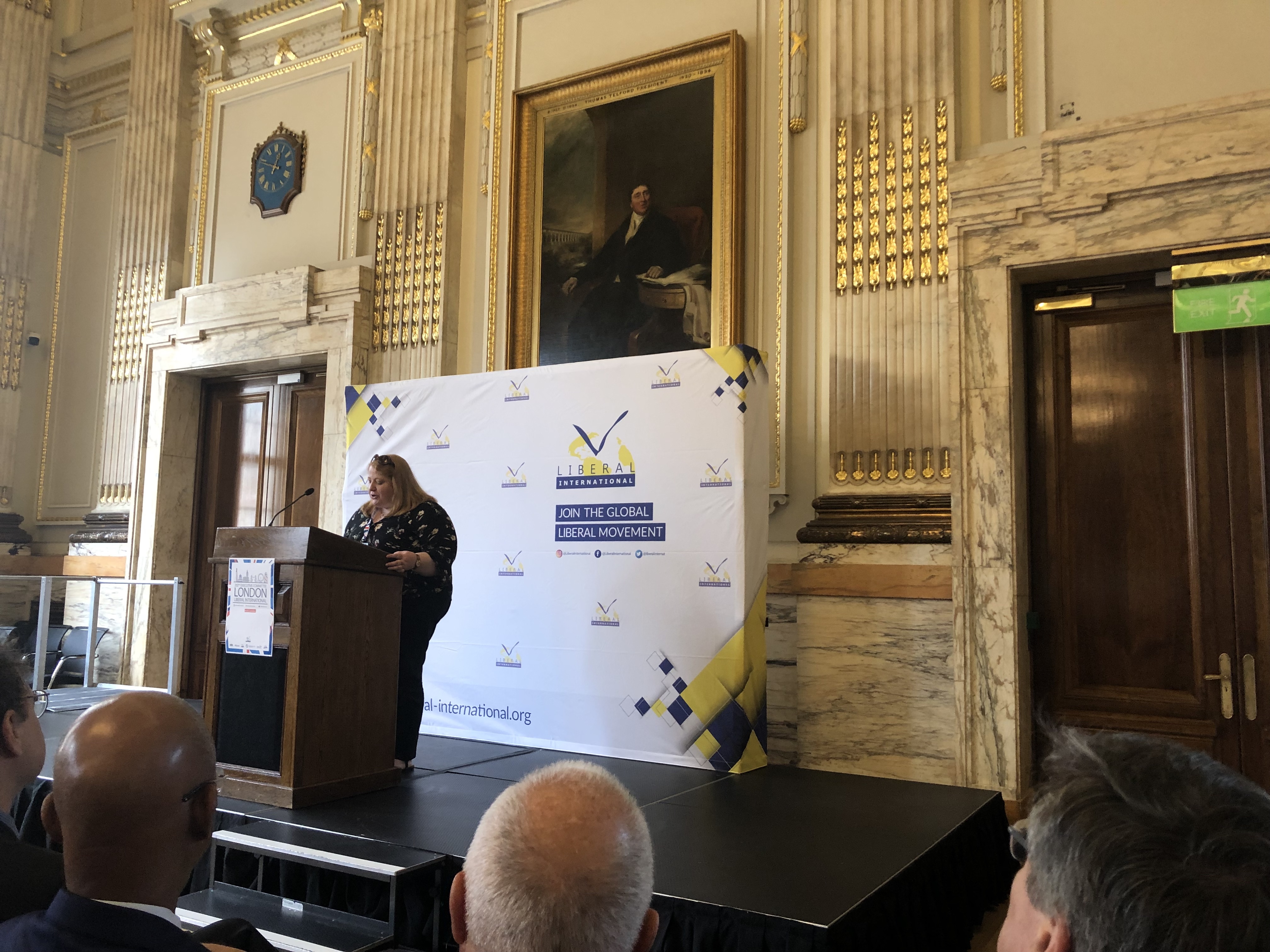
Ms Naomi Long, MEP & Leader of Alliance Party of Northern Ireland. “Liberals lead the way in gender equality and gender balance. More women must get more involved, as that could be part of the solution of several problems. Brexit is a huge problem for Northern Ireland and the result of English nationalism. This crisis can break up the UK. Scotland and Ireland want to stay in the EU.
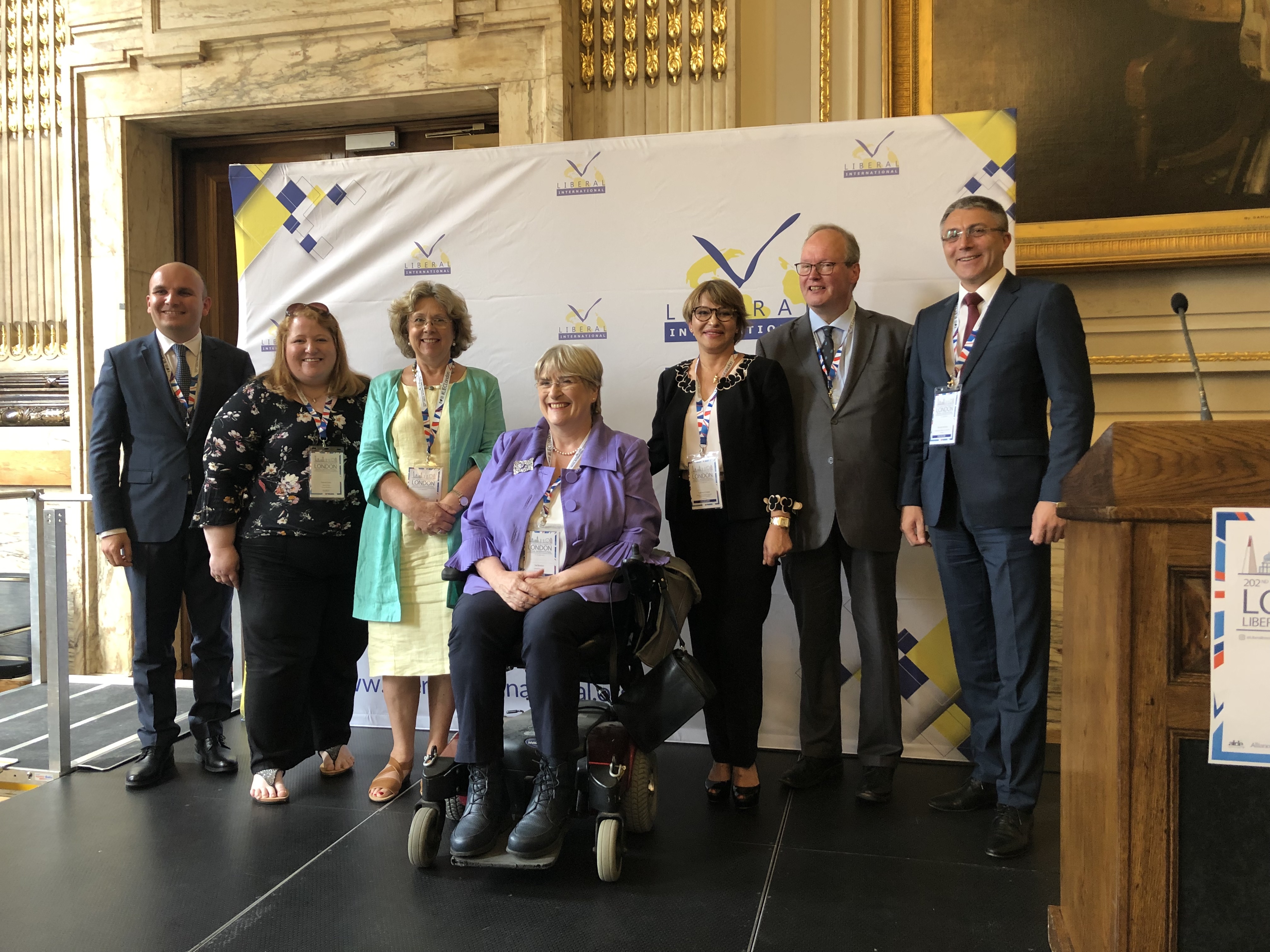
Nationalism is part of the problem. But:
• We must go for prosperity, progress and hope. Nationalism ignores that progress can better the world.
• We must fight for our values, that makes it difficult to be a liberal.
• Clean and consistent communication. Populism simplifies everything.
Most people don’t have time to wrestle with complex difficulties; we must communicate better and therein we can learn from populists. People must see benefit, so we must demonstrate delivering our promises”.
Rt.Hon. Baroness Lindsay Northover, President of the British Group of Liberal International. “All changes are a challenge, unfortunately the British are so divided about Brexit. These complex challenges we must tackle together. Climate change and migration cannot be defeated in isolation. UK will weaken by leaving the EU. We pushed the EU away”.
During the afternoon we attended one of the political sessions. The theme was “Europe Better In or Out?” The moderator was Annemie Neyts-Uyttebroeck, President of Honour of LI.
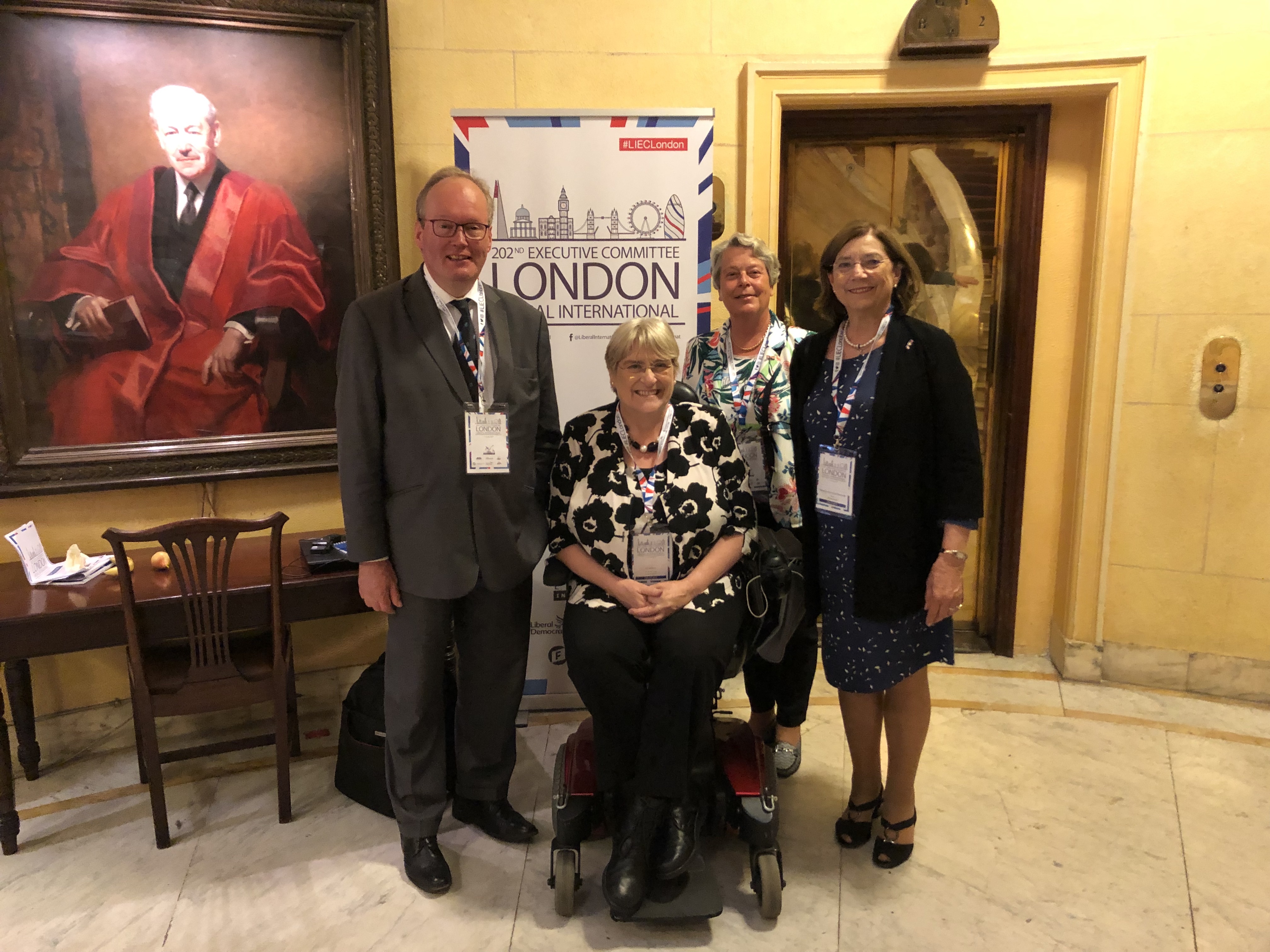
Hans van Baalen, President of ALDE party, gave some more details about the EU parliament. The rule of law, freedom of press, no exceptions and the Lisbon treaty are still valid in the EU parliament. The EU is functioning well.
Mr. Ümit Yalcin, ambassador of the Republic of Turkey, Turkey still wants to become a member of the EU. Perhaps that is better than Turkey going in the wrong direction, that was his question to the liberals to think about.
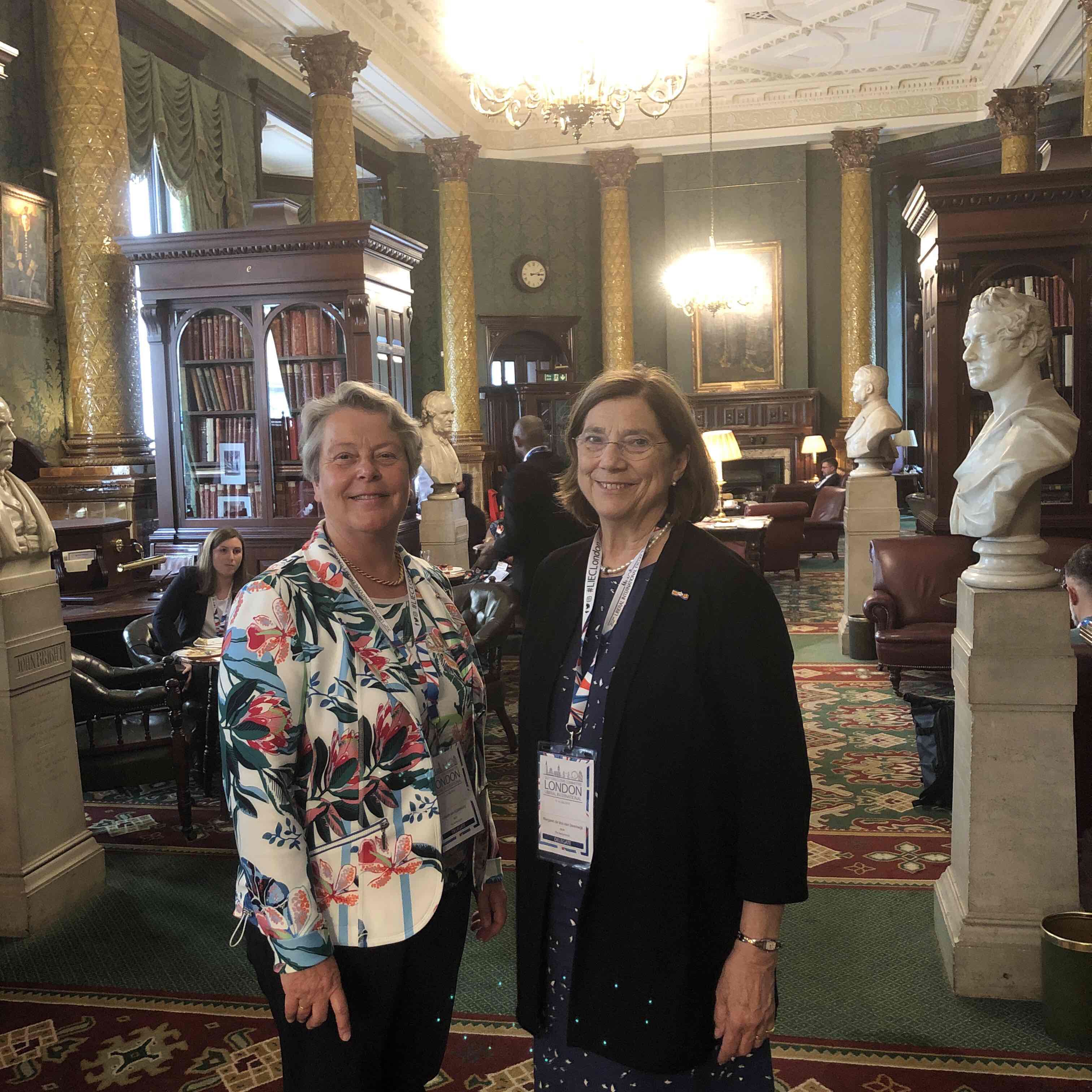
Ms. Trine Skei Grande, Minister of Culture & Gender equality, Venstre Norway. A system with only 2 parties gives the wrong challenge. Democracy means that small minorities are also to be heard not only the majority. That is not possible in a 2-party system. Structure builds the small countries. Trade is important but must combine with climate change. The Young vote for the climate. Problems: We find strong pollution in the seas and a fast-growing China. The change in our climate causes us to get more refugees and more problems. In Europe we are caught between Trump and China. In the Council of Europe cooperation with all countries is the future. It’s important that rules and the rule of Law must work.
Some more remarks were made by the speakers: The EU makes rules, but those rules are not always above the laws in Britain, but Britain must reform. Turkey is a neighbor and member of NATO. Political reform according to Hans van Baalen could help reform China to become a democracy.
The next day we were welcome at the National Liberal Club, established by Liberal Minister William Ewart Gladstone in 1882, home to the headquarters of Liberal International.
In this political session the theme was “Defending the Democratic Space”. Moderator was Astrid Thors, LI vice-president of LI.
Will Moy, director of Full Fact, gave us some ideas: we must get improvement of public information, trustworthy information. Elections – outsourcing transparency of content. For internet companies, it would be good to make better legislation.
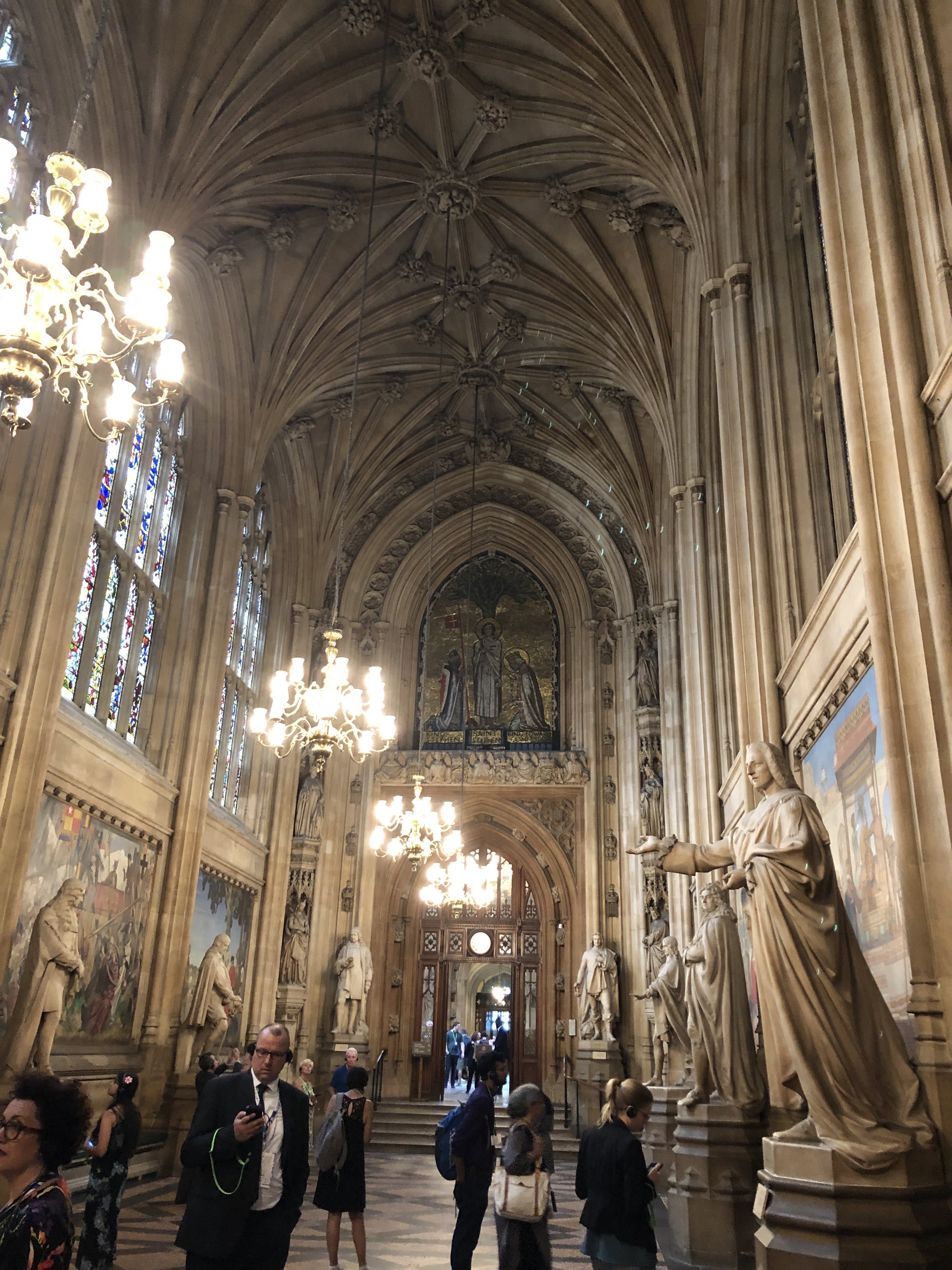
Politicians are often using false information,
- some as a standard,
- some as personal data as campaign,
- some use it just to kick up dust, undermining democracy. Politicians respond to this.
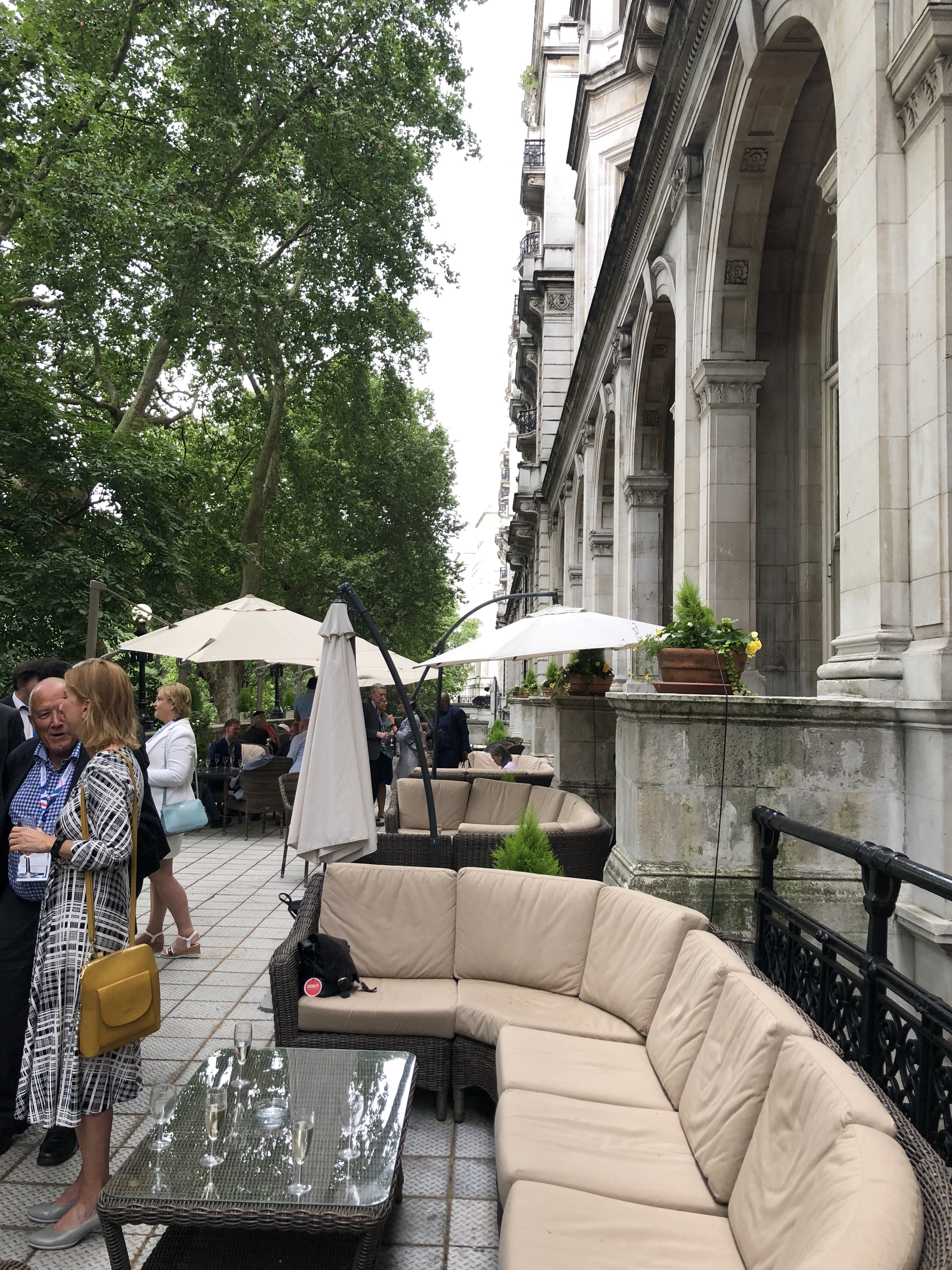
Education is important to understand new technical skills and to develop awareness of information. We need new laws on how to work with this new tech. Legislation though is not the solution. How we choose to behave in politics and in civil society is! We must promote good examples. Remember 5 years ago, is different from now – for elections be aware of that!!
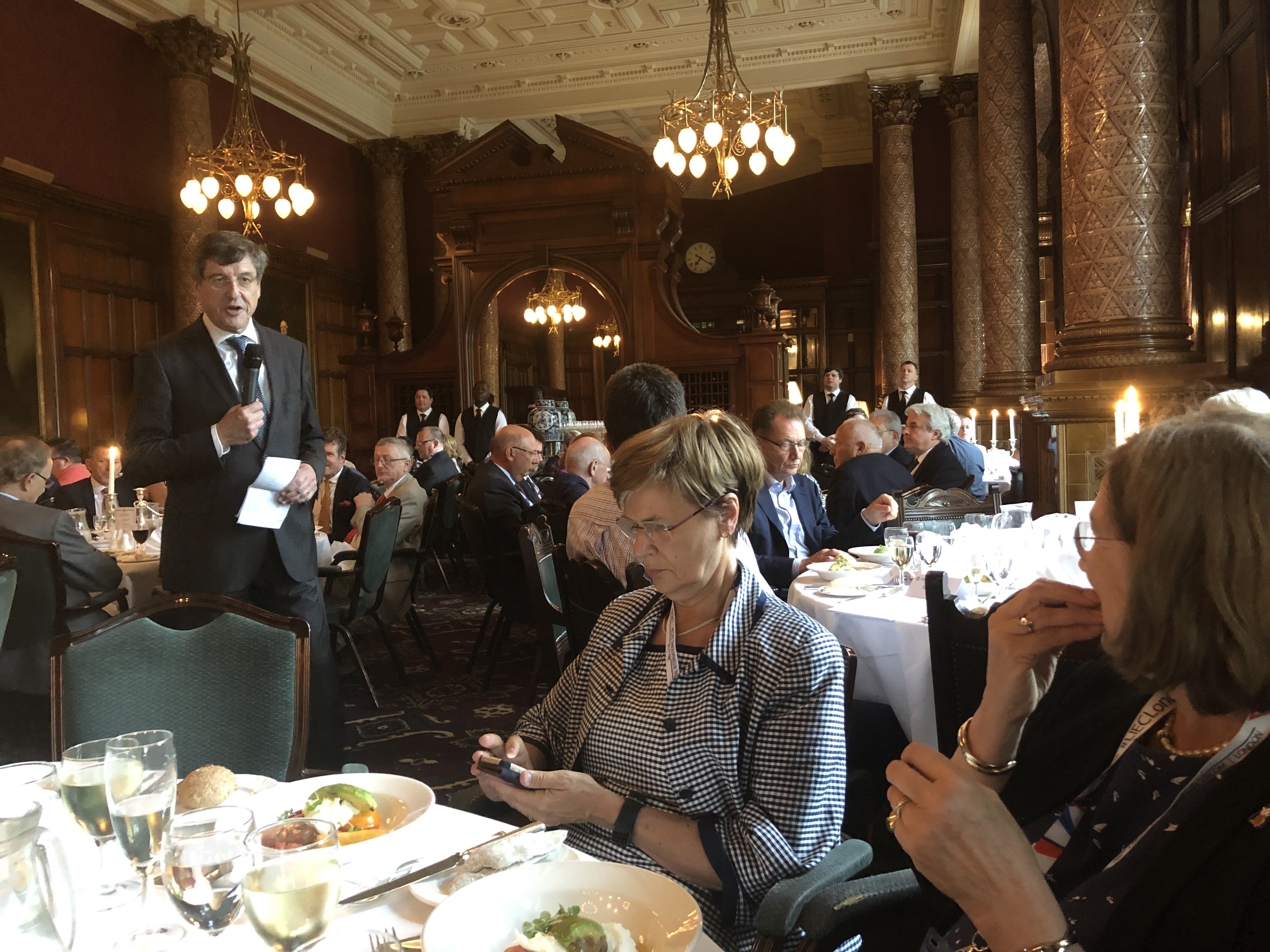
During the lunch period participants were able to visit both the Houses of Parliament.
In the evening the farewell dinner was given in the dining room of the National Liberal Club. We were welcomed by Karl-Heinze Paqué, deputy president of LI.
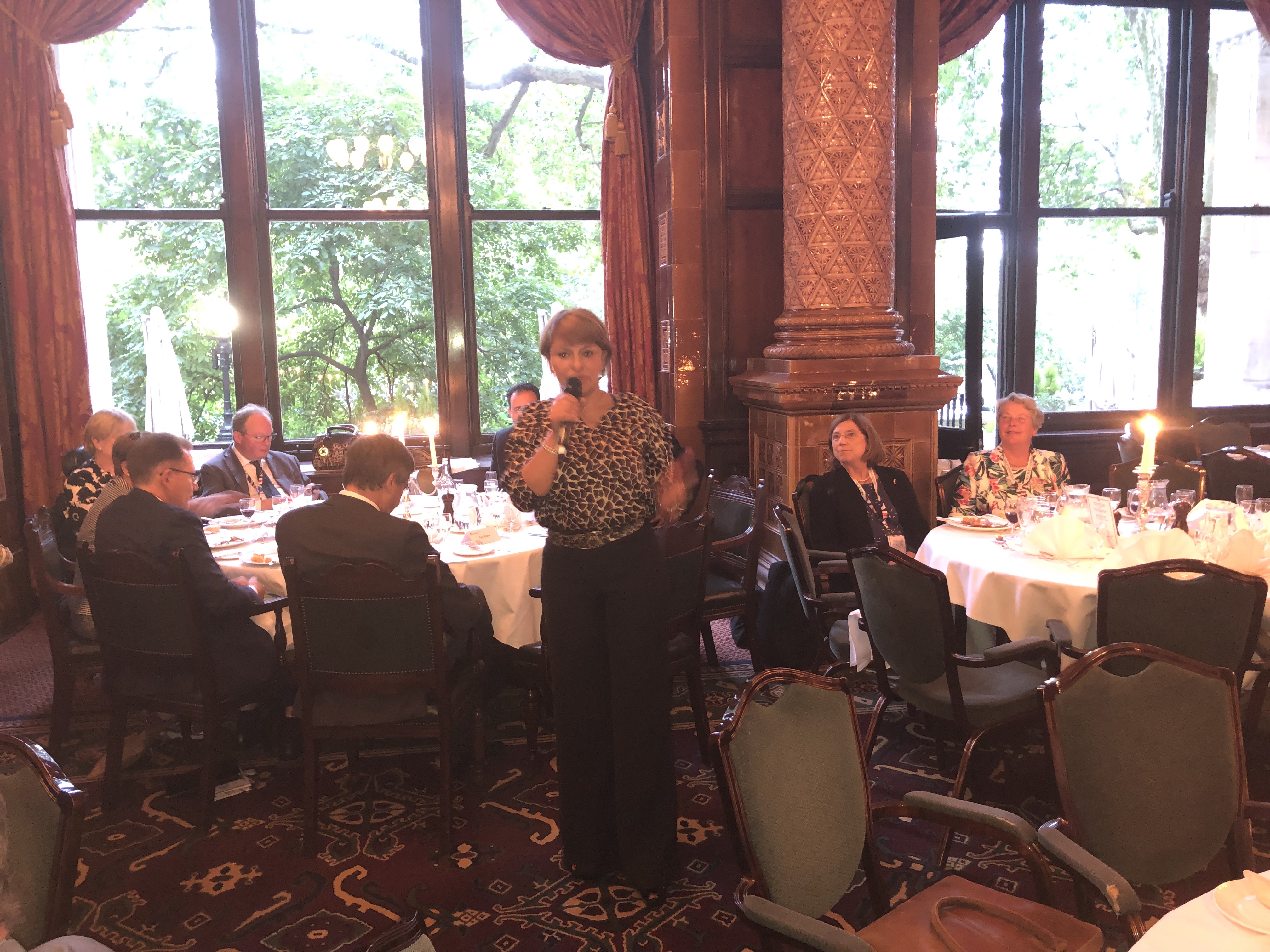
President Hakima el Haité wished us already a warm welcome for the next
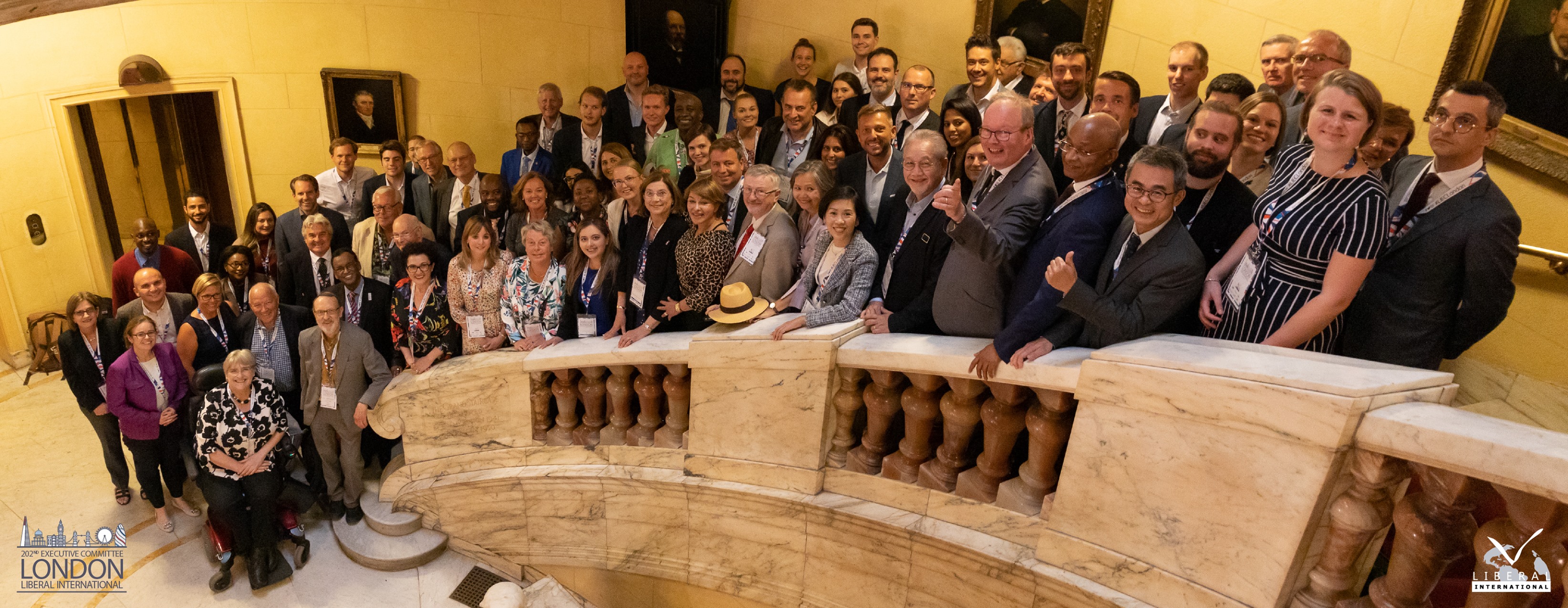
LI exc. Meeting which will be held in Morocco in November 2019.
Why do most national social protection systems lack mechanisms for enabling gender advancement? How can the Istanbul Convention help and what is its role as a global framework for social protection?
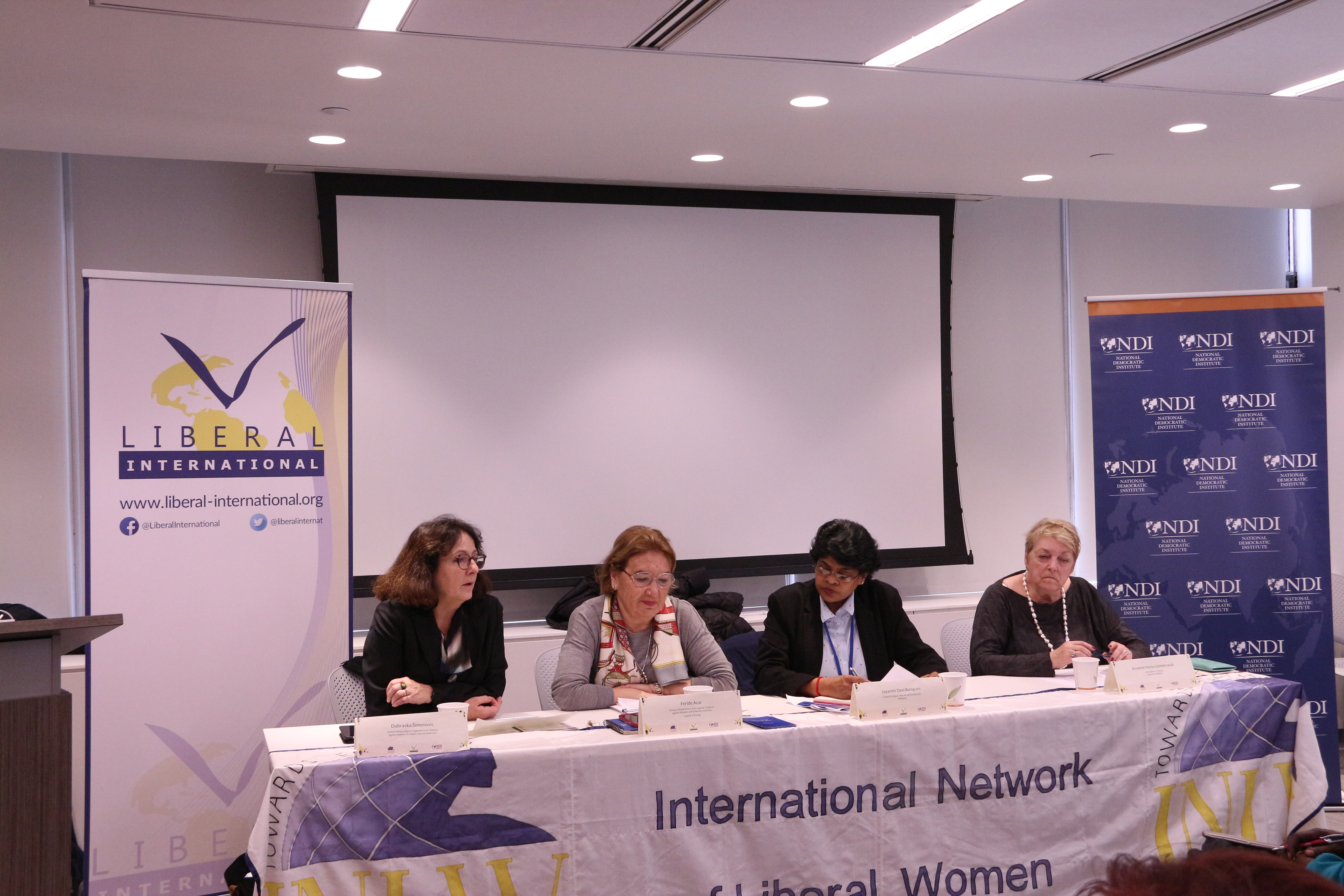
Moderator Jayanthi Devi Balaguru, president of INLW, introduced the speakers.
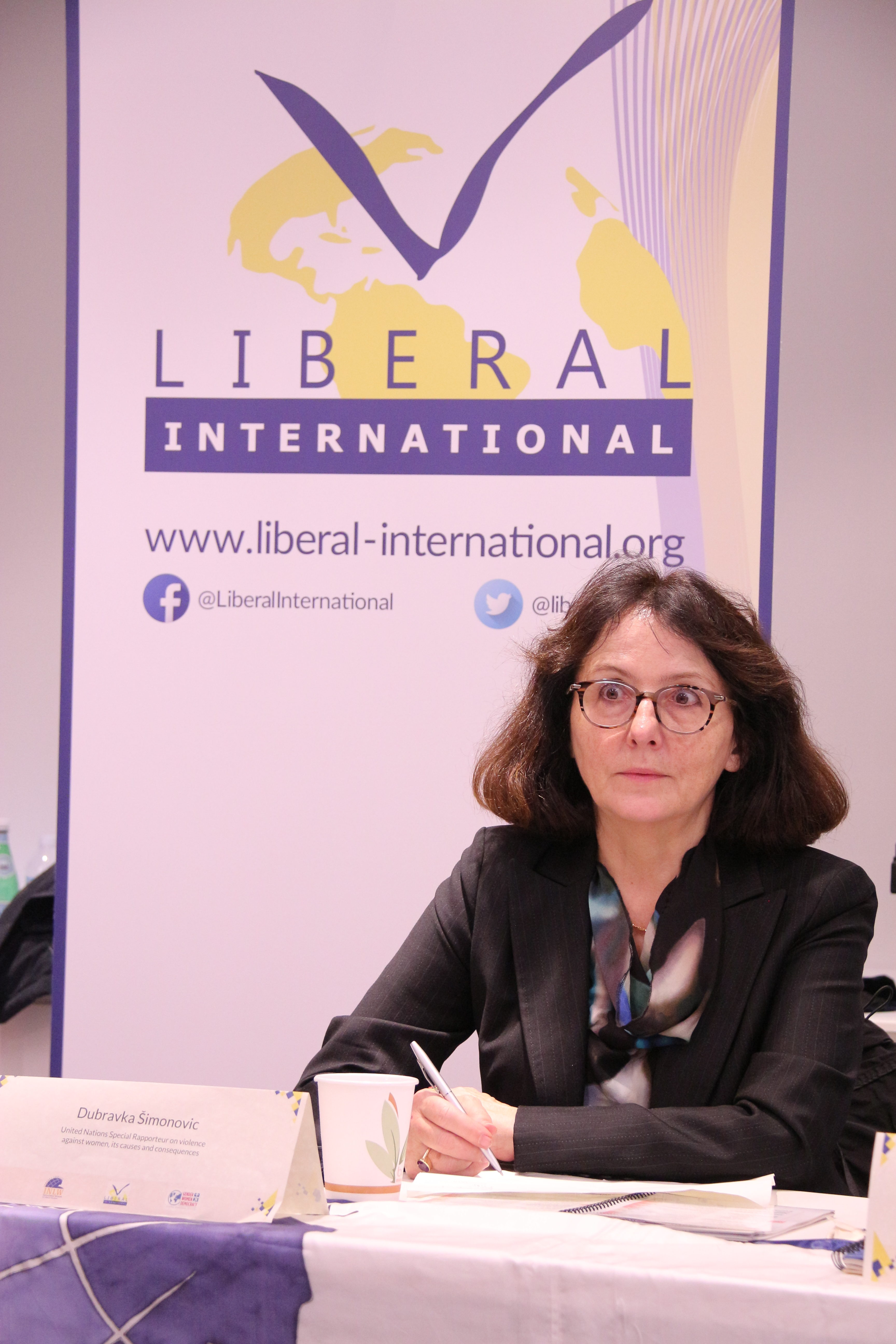
Dubrovka Simonovic, UN special Rapporteur on violence against women gave us some insight in her work. Since the start of this special function 25 years ago more is known about violence against women in detailed articles and UN has set standards that are now legally binding that can be used by everyone. What is domestic violence and what can be seen as other forms of violence. Unfortunately, not all countries have ratified these standards. She hopes that all countries will ratify the Istanbul Convention. Still if countries don’t ratify, women can use the Istanbul convention as a kind of roadmap.
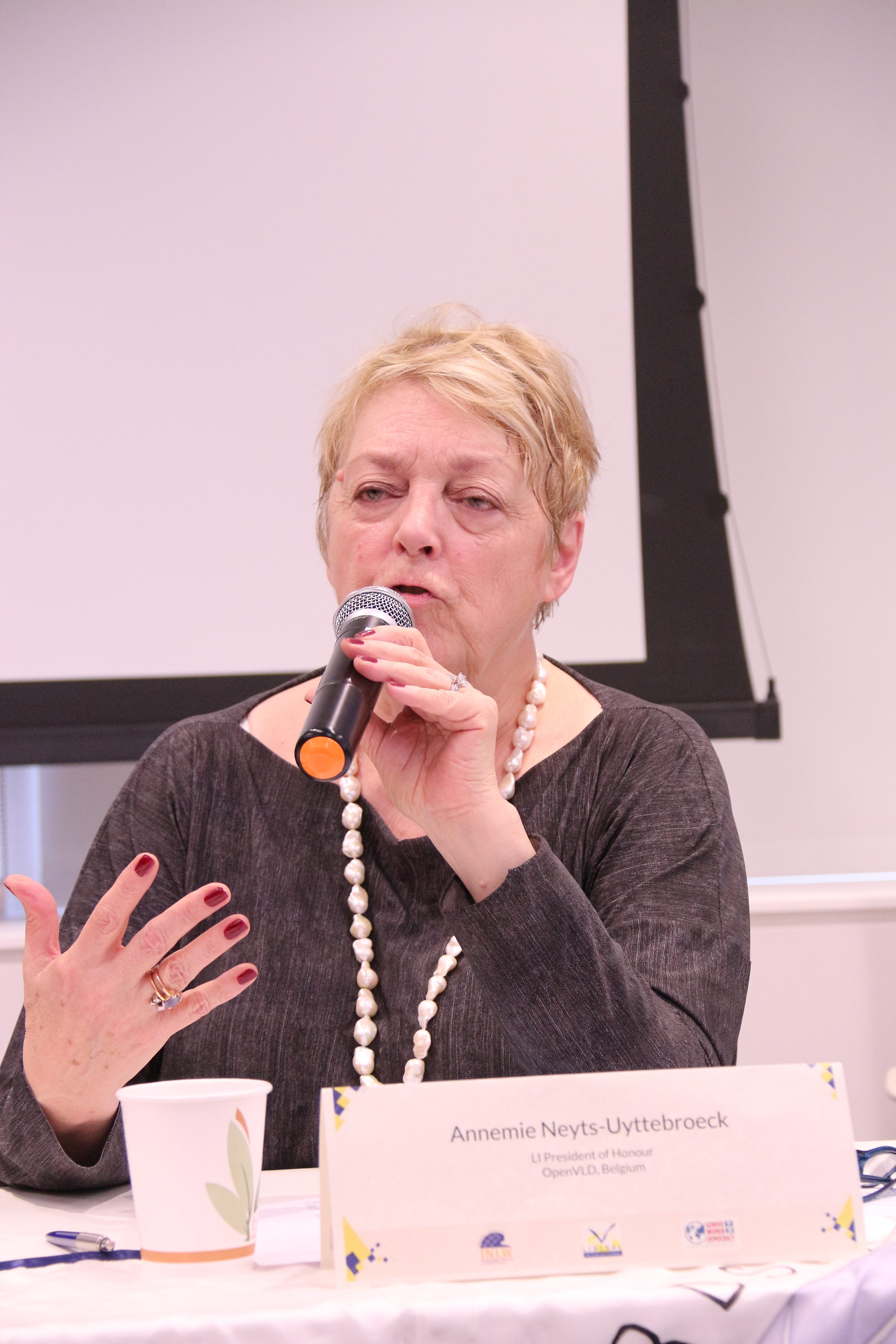
Annemie Neyts-Uyttebroeck, LI president of Honor, had a longstanding experience in European and International politics. In Belgium the standards were finally ratified in 2016. It took quite some time. The national action plan to set up “sexual result office centres” and to file sexual assault is not yet working. All partners should be set together, like in the Netherlands and the UK, than measures and instruments can be used in the same way.
Social protection is fundamental for equality of women and men. The UN reports on violence can be used as a reference to show that the weakest and poorest must be protected.
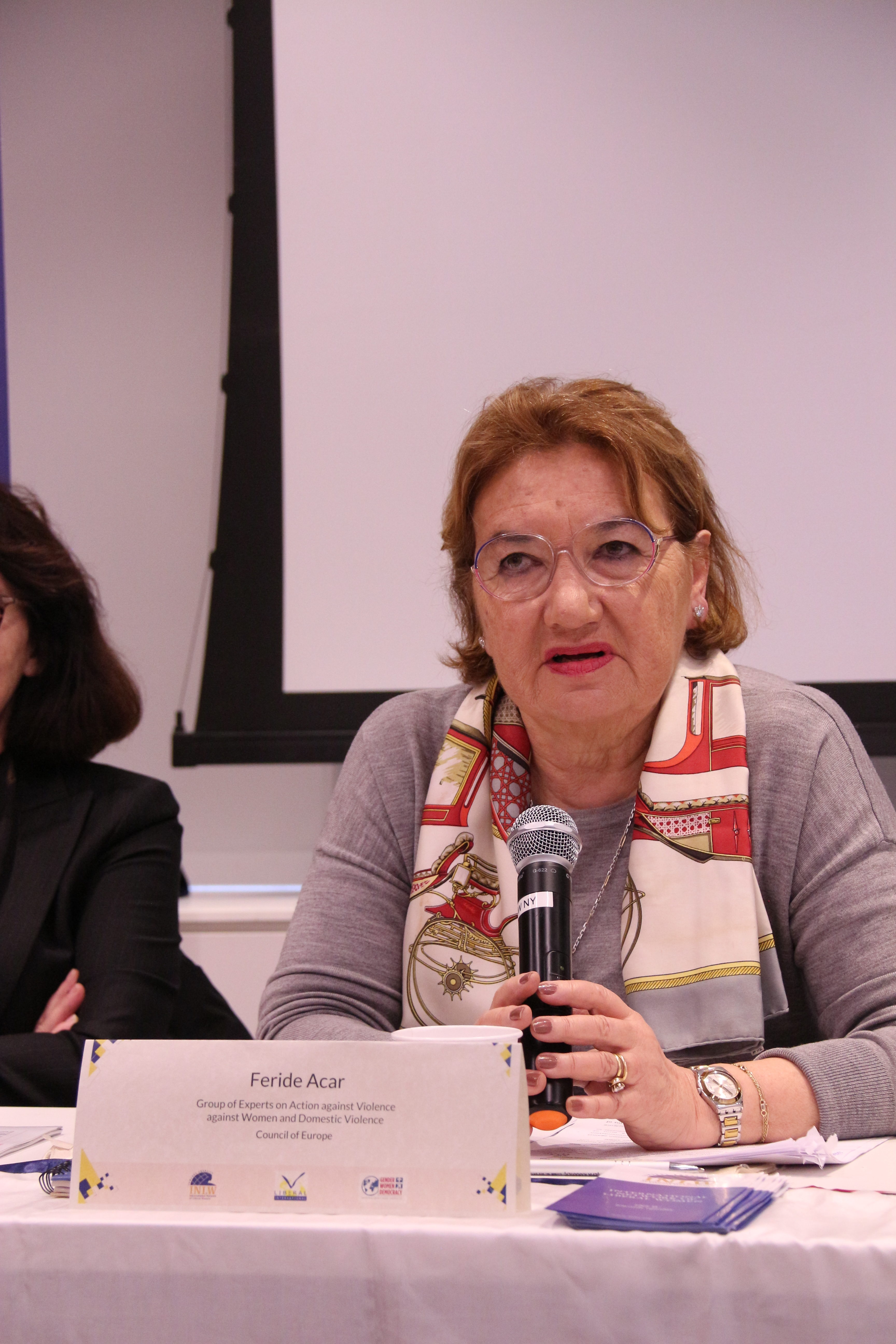
Feride Acar, Professor Emeritus of Political Science and Public Administration at Middle East Technical University in Ankara Turk, gave us some history about how some of the reports slowly came into existence. CEDAW (Elimination of All Forms of Discrimination against Women) did not have articles on violence against women at the time. In 1992 the discrimination against women became relevant and was added to articles in UN declarations. In 1993 regional treaties were added. In 2011 the Istanbul Convention adopted violence against women and started to monitor. Now 34 of the 47 countries of the Council of Europe have ratified, 11 have signed the treaty, but still should ratify it. Altogether it is a robust instrument in Europe.
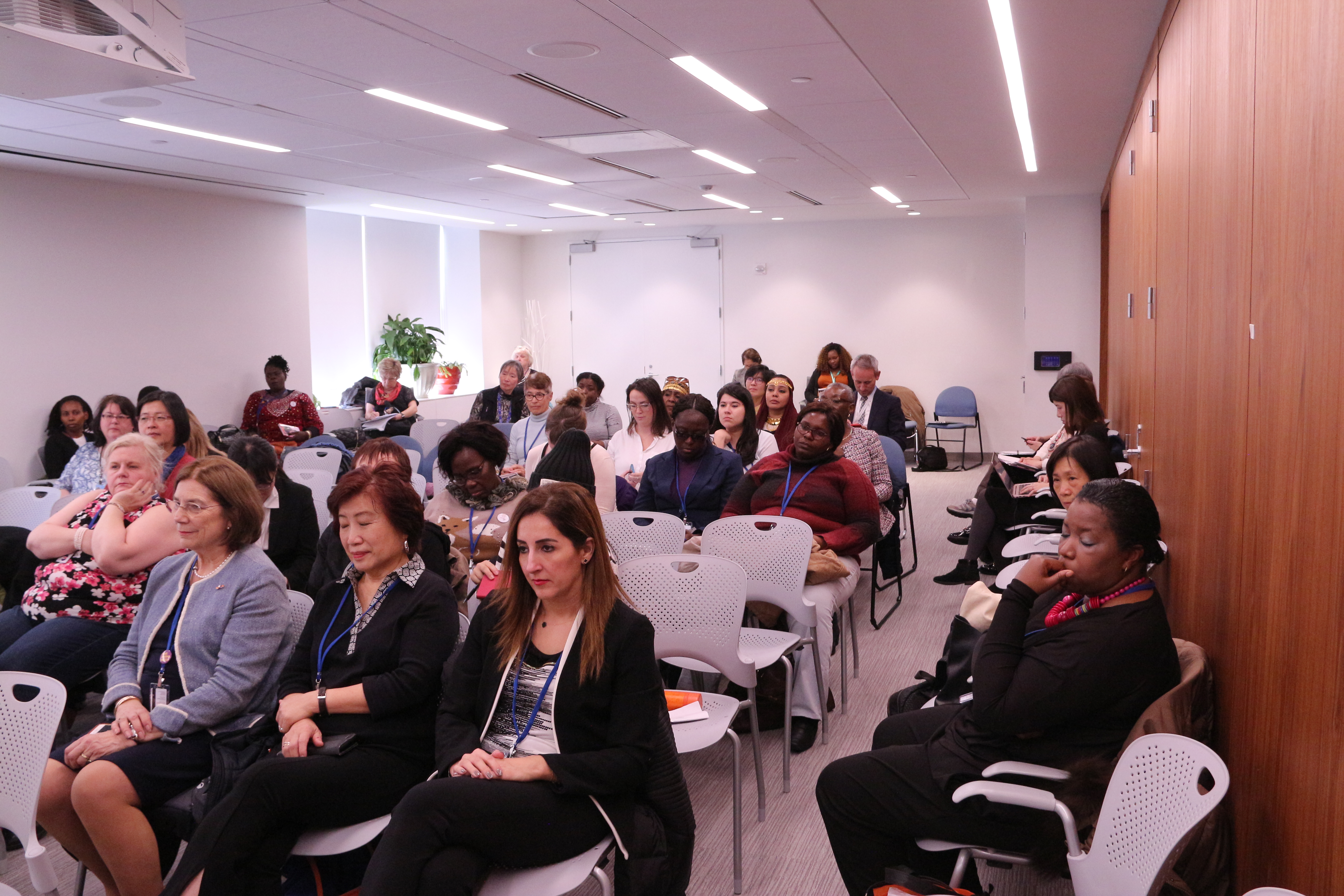
In 2017 CEDAW updated its own treaty. Gender is defined and legally binding. Gender was not a legal term originally. Gender must be accepted in education and politics. In some countries gender as a legal term is not accepted. Fortunately, most countries have ratified the new CEDAW. Other countries can use CEDAW if they don’t have the Istanbul Convention. Cedaw has been signed by the USA but not ratified. Also, civil society can use the report. Reports have impact on governments, very often they don’t have data and with these from other organizations they take measures in the end. Now we must add online violence and some more about digital spaces. Protection of platforms must also be added. CSW is a good setting for keeping everyone informed and to up-date treaties and global networks.
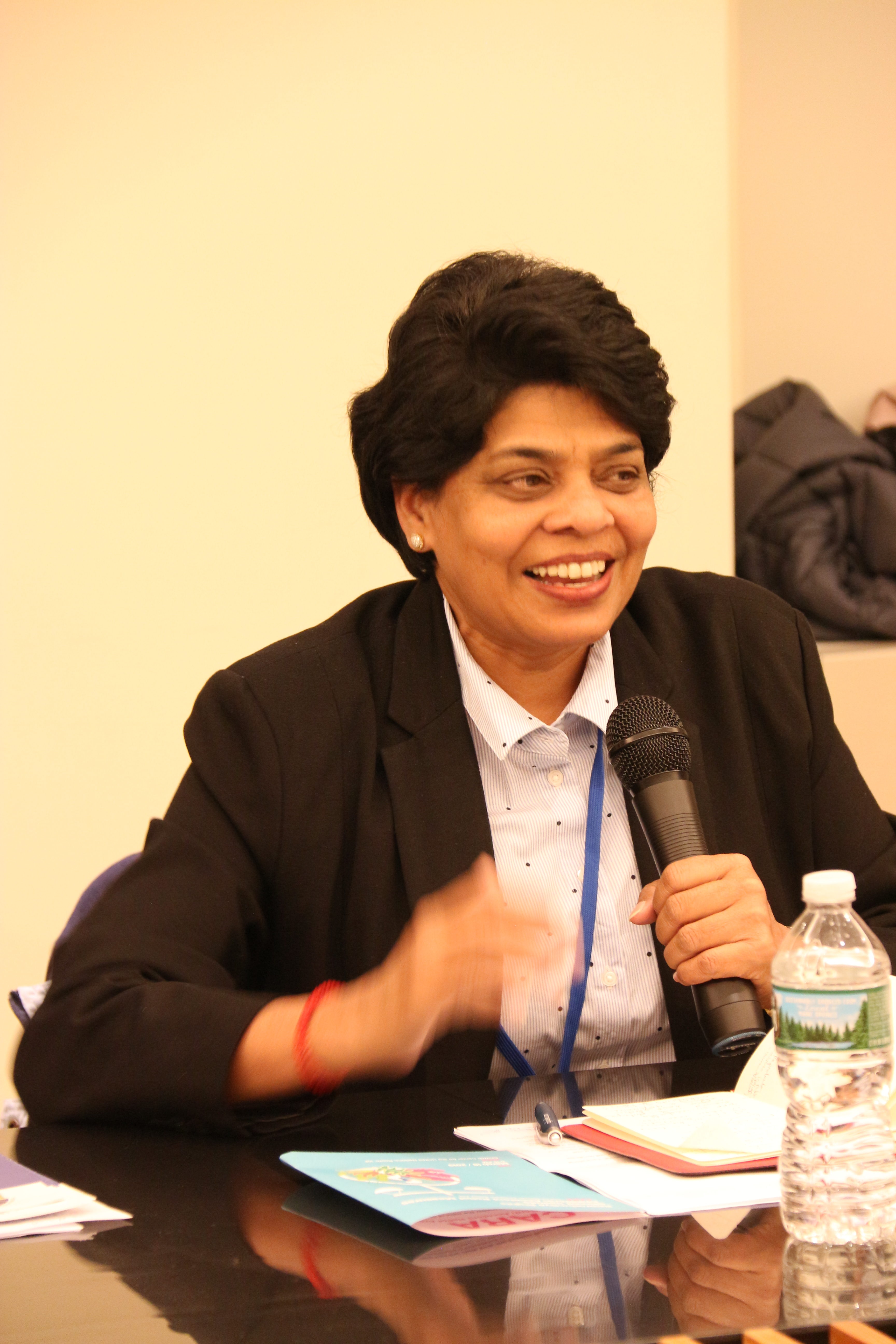
Jayanthi Devi Balaguru, finally stated “Women need to keep working & stand together for Women’s rights and equality for all women. It is a challenging time for gender equality around the world. It is important for liberal parties to stick together and inspire each other. Treaties such as the Istanbul Convention are relevant for a better position for women and girls. CSW is a useful meeting point to expand your network and influence governments and hopefully next year many will meet again in NY”.

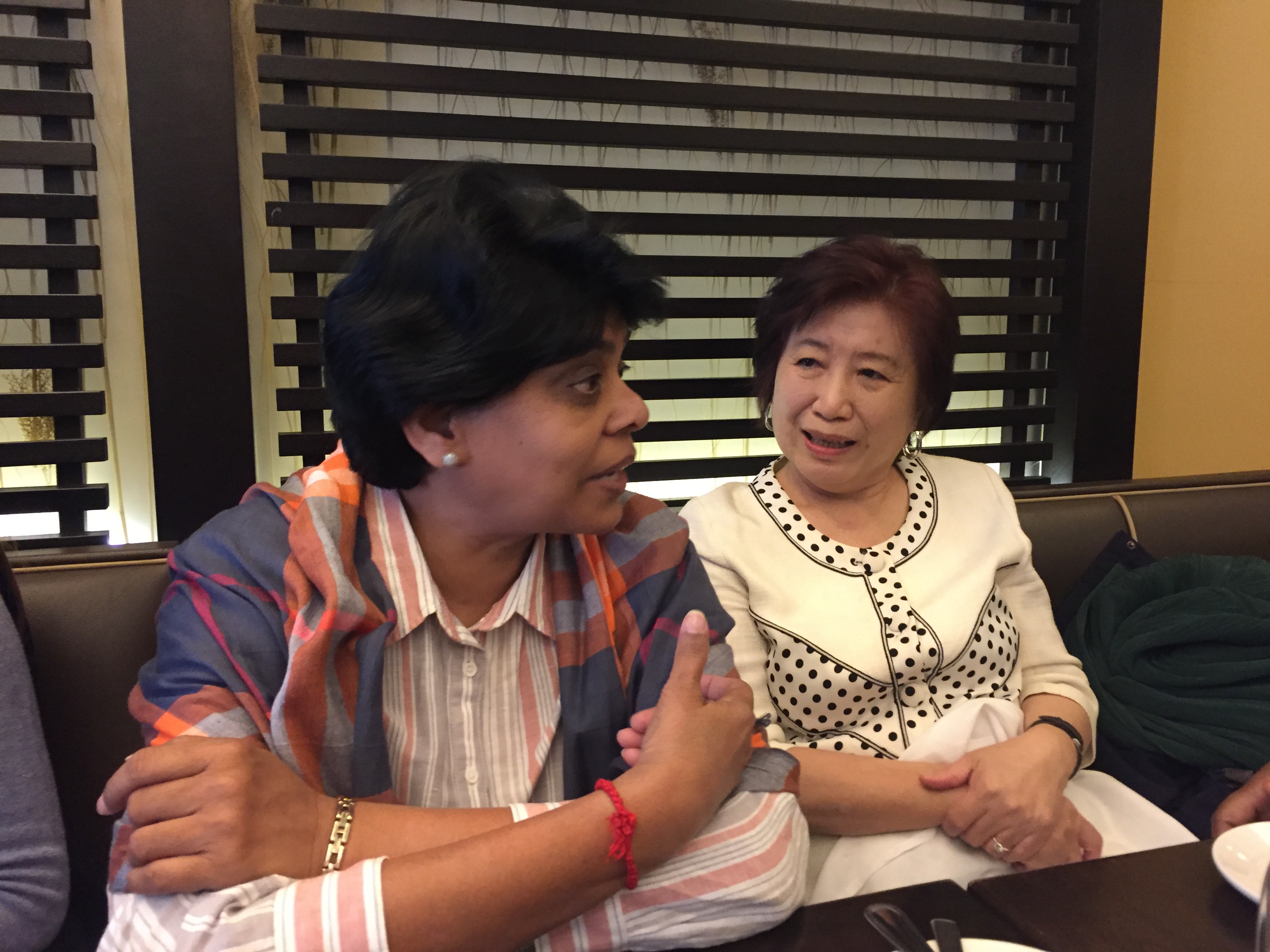
In this new year the Board met in New York in preparation of several events that we are organizing this year and to hear the plans of our new President, Jayanthi Devi Balaguru. She was happy to welcome our new Board members. Many thanks were given to Margaret de Vos van Steenwijk-Groeneveld (Past-President) for all her work during her 6-year period as president of INLW. Also, much gratitude was given to Tamara Dancheva for her assistance in organizing side events at LI congresses and here at CSW.

Jayanthi stressed that what we need as INLW is teamwork and to express our liberal values even more in a more active role. One of our concerns is financing events so more promoting of events and finding more finances is a priority. One of the methods to become more known is by using twitter and face book. For next year hosting a side event is again important to achieve.
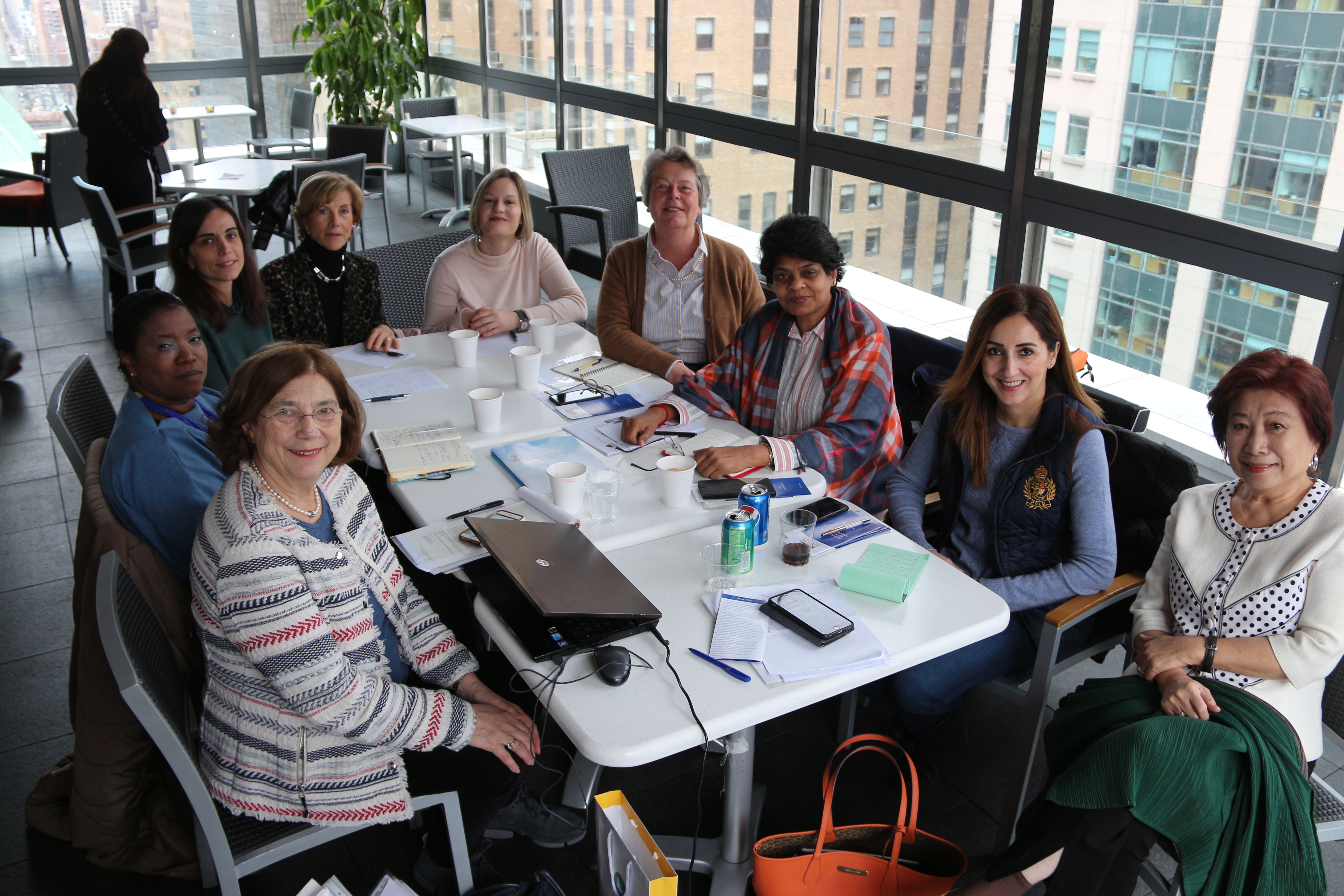
Jayanthi will try to send out an annual report so that some minor events can also be reported about besides the reports that are made by board members of conferences and CSW.
The board will meet again sometime during this year with as many members present as possible.
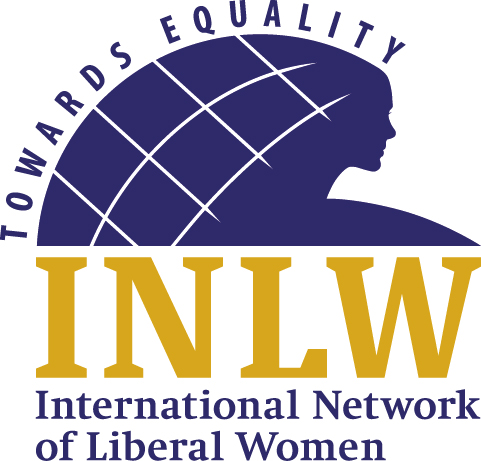
 Visit our Facebook page
Visit our Facebook page